Influence of Organizational Culture, Politics, Power, and Motivation on Behavior and Performance
VerifiedAdded on 2023/01/05
|20
|5626
|95
AI Summary
This report explores the influence of organizational culture, politics, power, and motivation on individual and team behavior and performance. It discusses the different types of organizational culture and their impact, as well as the role of politics and power in shaping behavior. The report also examines various motivational theories and their implications for achieving organizational goals. Recommendations are provided for creating an effective work environment.
Contribute Materials
Your contribution can guide someone’s learning journey. Share your
documents today.
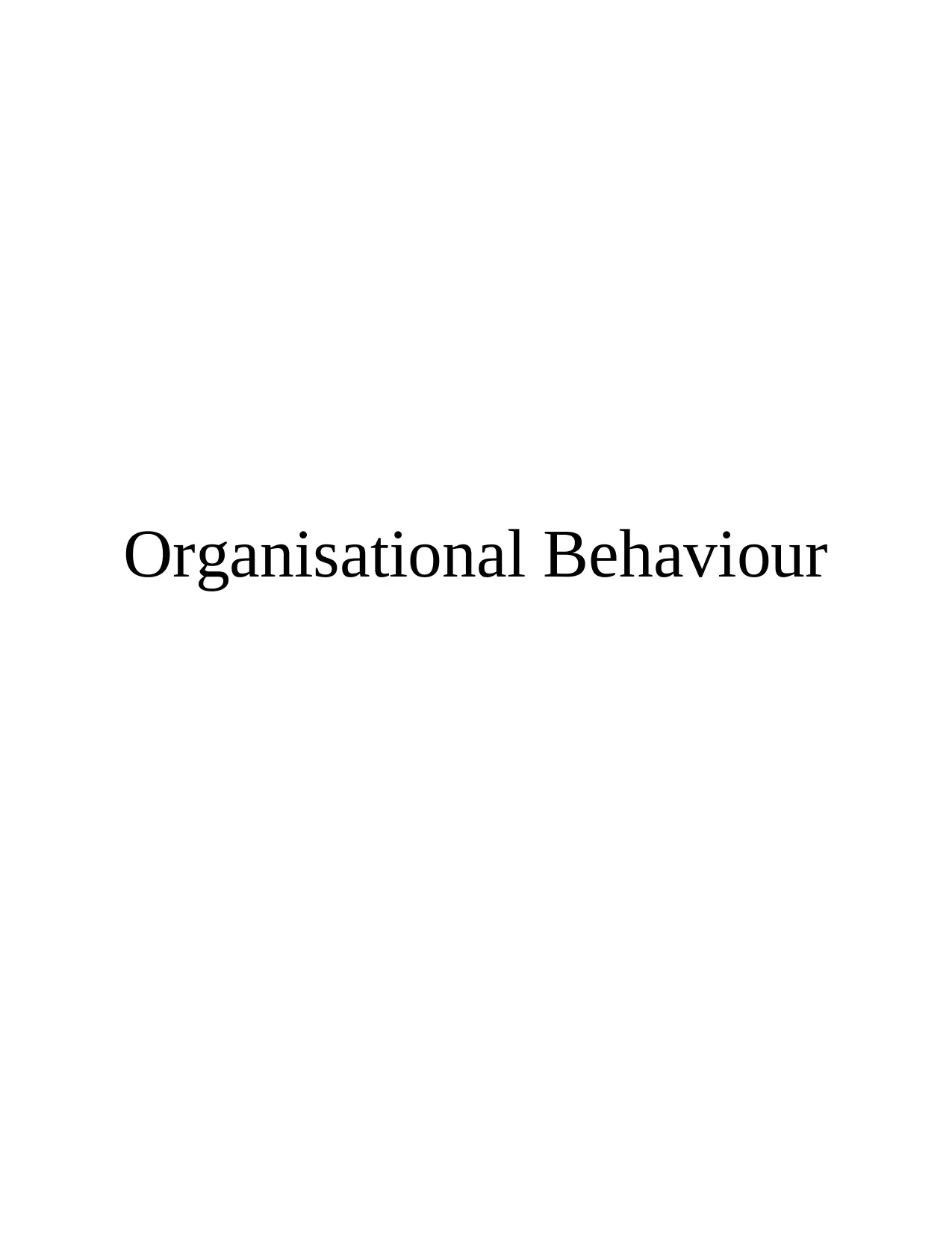
Organisational Behaviour
Secure Best Marks with AI Grader
Need help grading? Try our AI Grader for instant feedback on your assignments.
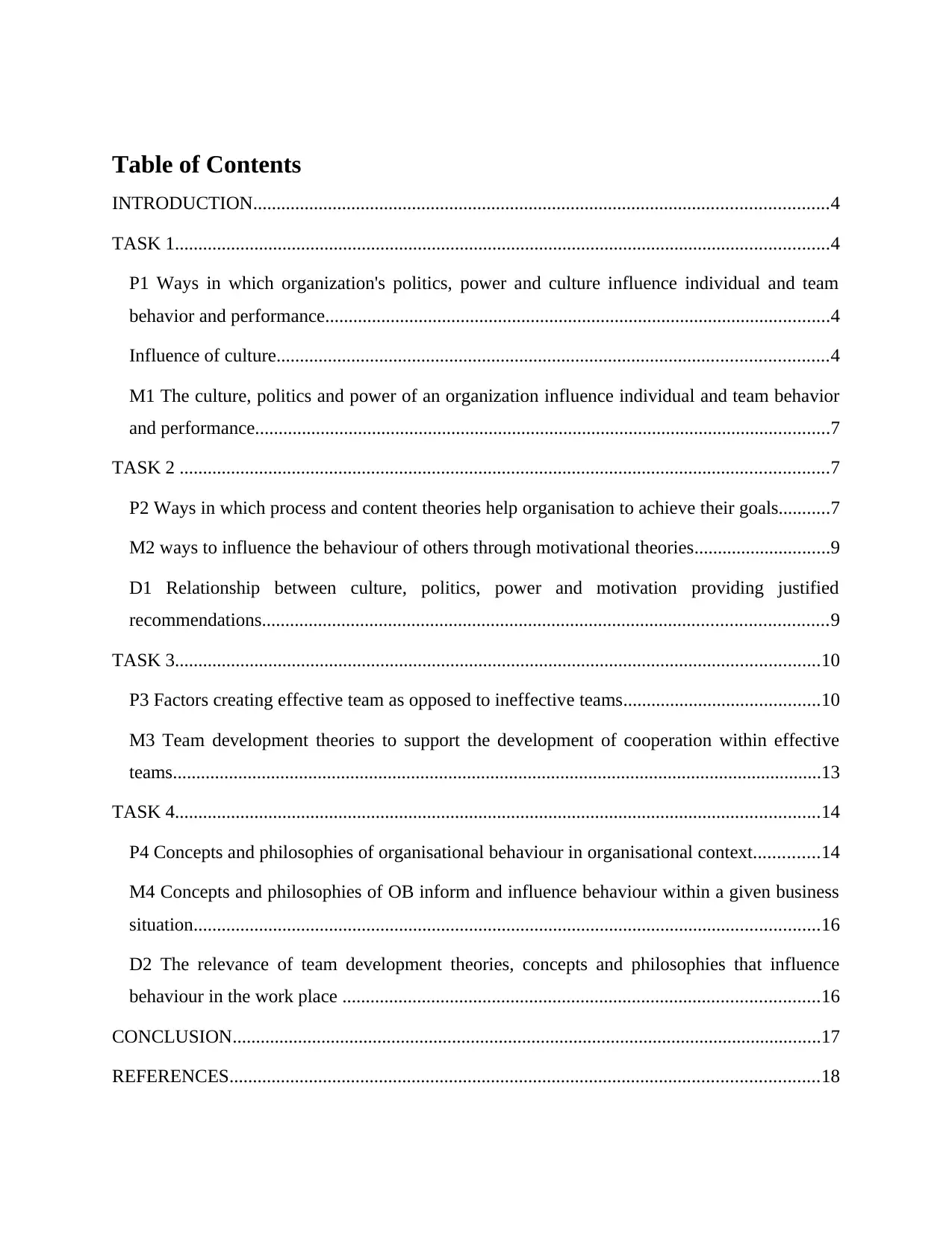
Table of Contents
INTRODUCTION...........................................................................................................................4
TASK 1............................................................................................................................................4
P1 Ways in which organization's politics, power and culture influence individual and team
behavior and performance............................................................................................................4
Influence of culture......................................................................................................................4
M1 The culture, politics and power of an organization influence individual and team behavior
and performance...........................................................................................................................7
TASK 2 ...........................................................................................................................................7
P2 Ways in which process and content theories help organisation to achieve their goals...........7
M2 ways to influence the behaviour of others through motivational theories.............................9
D1 Relationship between culture, politics, power and motivation providing justified
recommendations.........................................................................................................................9
TASK 3..........................................................................................................................................10
P3 Factors creating effective team as opposed to ineffective teams..........................................10
M3 Team development theories to support the development of cooperation within effective
teams...........................................................................................................................................13
TASK 4..........................................................................................................................................14
P4 Concepts and philosophies of organisational behaviour in organisational context..............14
M4 Concepts and philosophies of OB inform and influence behaviour within a given business
situation......................................................................................................................................16
D2 The relevance of team development theories, concepts and philosophies that influence
behaviour in the work place ......................................................................................................16
CONCLUSION..............................................................................................................................17
REFERENCES..............................................................................................................................18
INTRODUCTION...........................................................................................................................4
TASK 1............................................................................................................................................4
P1 Ways in which organization's politics, power and culture influence individual and team
behavior and performance............................................................................................................4
Influence of culture......................................................................................................................4
M1 The culture, politics and power of an organization influence individual and team behavior
and performance...........................................................................................................................7
TASK 2 ...........................................................................................................................................7
P2 Ways in which process and content theories help organisation to achieve their goals...........7
M2 ways to influence the behaviour of others through motivational theories.............................9
D1 Relationship between culture, politics, power and motivation providing justified
recommendations.........................................................................................................................9
TASK 3..........................................................................................................................................10
P3 Factors creating effective team as opposed to ineffective teams..........................................10
M3 Team development theories to support the development of cooperation within effective
teams...........................................................................................................................................13
TASK 4..........................................................................................................................................14
P4 Concepts and philosophies of organisational behaviour in organisational context..............14
M4 Concepts and philosophies of OB inform and influence behaviour within a given business
situation......................................................................................................................................16
D2 The relevance of team development theories, concepts and philosophies that influence
behaviour in the work place ......................................................................................................16
CONCLUSION..............................................................................................................................17
REFERENCES..............................................................................................................................18
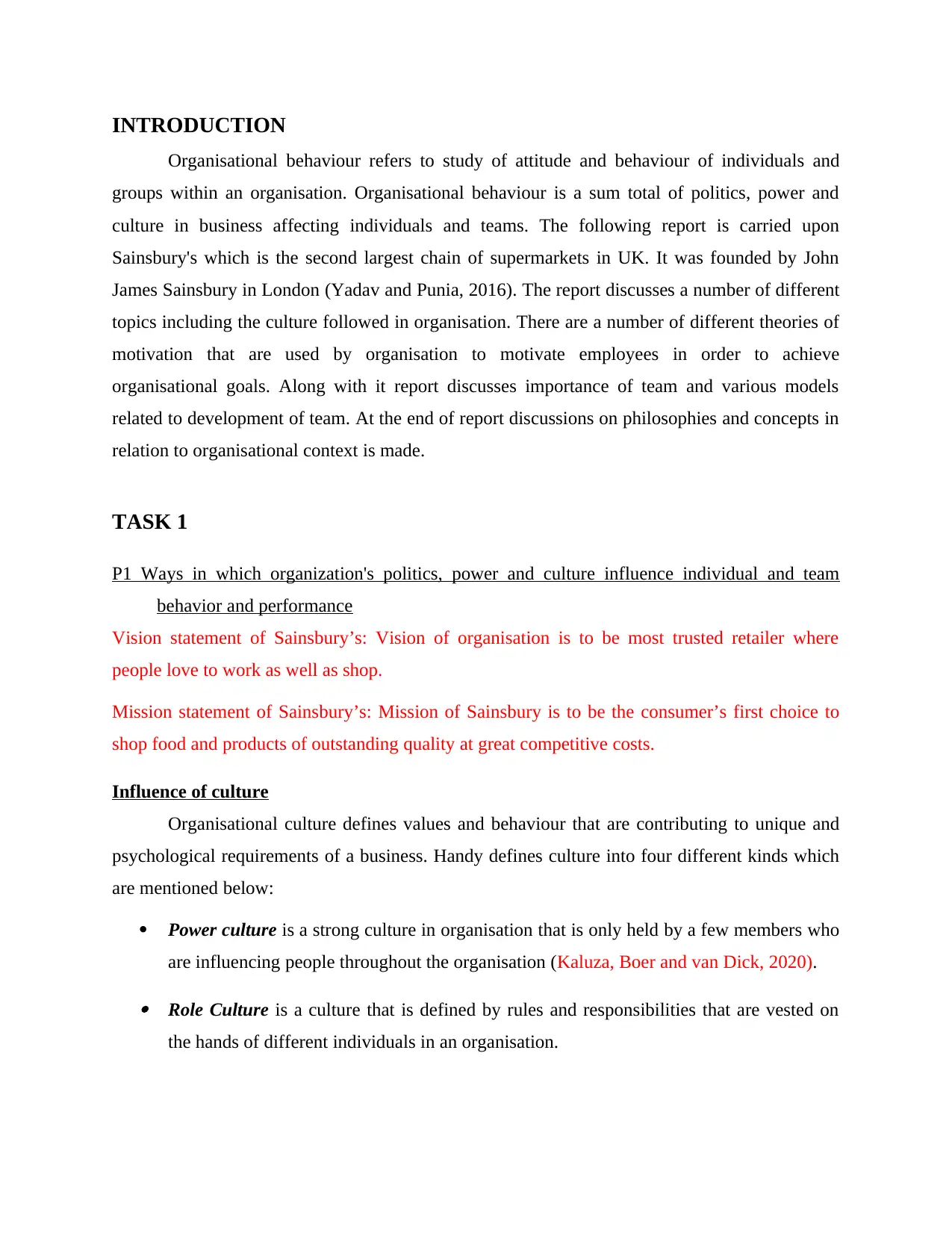
INTRODUCTION
Organisational behaviour refers to study of attitude and behaviour of individuals and
groups within an organisation. Organisational behaviour is a sum total of politics, power and
culture in business affecting individuals and teams. The following report is carried upon
Sainsbury's which is the second largest chain of supermarkets in UK. It was founded by John
James Sainsbury in London (Yadav and Punia, 2016). The report discusses a number of different
topics including the culture followed in organisation. There are a number of different theories of
motivation that are used by organisation to motivate employees in order to achieve
organisational goals. Along with it report discusses importance of team and various models
related to development of team. At the end of report discussions on philosophies and concepts in
relation to organisational context is made.
TASK 1
P1 Ways in which organization's politics, power and culture influence individual and team
behavior and performance
Vision statement of Sainsbury’s: Vision of organisation is to be most trusted retailer where
people love to work as well as shop.
Mission statement of Sainsbury’s: Mission of Sainsbury is to be the consumer’s first choice to
shop food and products of outstanding quality at great competitive costs.
Influence of culture
Organisational culture defines values and behaviour that are contributing to unique and
psychological requirements of a business. Handy defines culture into four different kinds which
are mentioned below:
Power culture is a strong culture in organisation that is only held by a few members who
are influencing people throughout the organisation (Kaluza, Boer and van Dick, 2020).
Role Culture is a culture that is defined by rules and responsibilities that are vested on
the hands of different individuals in an organisation.
Organisational behaviour refers to study of attitude and behaviour of individuals and
groups within an organisation. Organisational behaviour is a sum total of politics, power and
culture in business affecting individuals and teams. The following report is carried upon
Sainsbury's which is the second largest chain of supermarkets in UK. It was founded by John
James Sainsbury in London (Yadav and Punia, 2016). The report discusses a number of different
topics including the culture followed in organisation. There are a number of different theories of
motivation that are used by organisation to motivate employees in order to achieve
organisational goals. Along with it report discusses importance of team and various models
related to development of team. At the end of report discussions on philosophies and concepts in
relation to organisational context is made.
TASK 1
P1 Ways in which organization's politics, power and culture influence individual and team
behavior and performance
Vision statement of Sainsbury’s: Vision of organisation is to be most trusted retailer where
people love to work as well as shop.
Mission statement of Sainsbury’s: Mission of Sainsbury is to be the consumer’s first choice to
shop food and products of outstanding quality at great competitive costs.
Influence of culture
Organisational culture defines values and behaviour that are contributing to unique and
psychological requirements of a business. Handy defines culture into four different kinds which
are mentioned below:
Power culture is a strong culture in organisation that is only held by a few members who
are influencing people throughout the organisation (Kaluza, Boer and van Dick, 2020).
Role Culture is a culture that is defined by rules and responsibilities that are vested on
the hands of different individuals in an organisation.
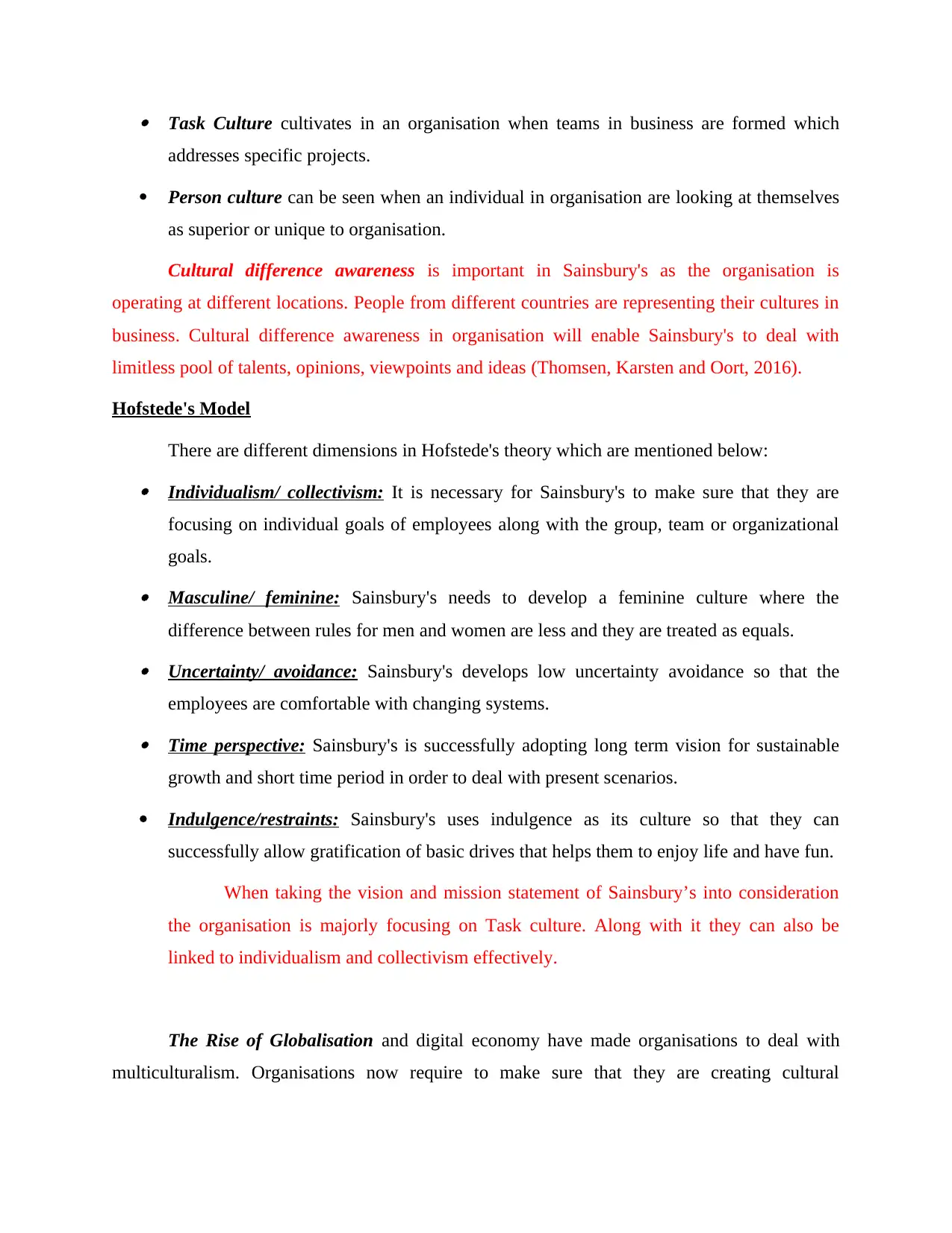
Task Culture cultivates in an organisation when teams in business are formed which
addresses specific projects.
Person culture can be seen when an individual in organisation are looking at themselves
as superior or unique to organisation.
Cultural difference awareness is important in Sainsbury's as the organisation is
operating at different locations. People from different countries are representing their cultures in
business. Cultural difference awareness in organisation will enable Sainsbury's to deal with
limitless pool of talents, opinions, viewpoints and ideas (Thomsen, Karsten and Oort, 2016).
Hofstede's Model
There are different dimensions in Hofstede's theory which are mentioned below: Individualism/ collectivism: It is necessary for Sainsbury's to make sure that they are
focusing on individual goals of employees along with the group, team or organizational
goals. Masculine/ feminine: Sainsbury's needs to develop a feminine culture where the
difference between rules for men and women are less and they are treated as equals. Uncertainty/ avoidance: Sainsbury's develops low uncertainty avoidance so that the
employees are comfortable with changing systems. Time perspective: Sainsbury's is successfully adopting long term vision for sustainable
growth and short time period in order to deal with present scenarios.
Indulgence/restraints: Sainsbury's uses indulgence as its culture so that they can
successfully allow gratification of basic drives that helps them to enjoy life and have fun.
When taking the vision and mission statement of Sainsbury’s into consideration
the organisation is majorly focusing on Task culture. Along with it they can also be
linked to individualism and collectivism effectively.
The Rise of Globalisation and digital economy have made organisations to deal with
multiculturalism. Organisations now require to make sure that they are creating cultural
addresses specific projects.
Person culture can be seen when an individual in organisation are looking at themselves
as superior or unique to organisation.
Cultural difference awareness is important in Sainsbury's as the organisation is
operating at different locations. People from different countries are representing their cultures in
business. Cultural difference awareness in organisation will enable Sainsbury's to deal with
limitless pool of talents, opinions, viewpoints and ideas (Thomsen, Karsten and Oort, 2016).
Hofstede's Model
There are different dimensions in Hofstede's theory which are mentioned below: Individualism/ collectivism: It is necessary for Sainsbury's to make sure that they are
focusing on individual goals of employees along with the group, team or organizational
goals. Masculine/ feminine: Sainsbury's needs to develop a feminine culture where the
difference between rules for men and women are less and they are treated as equals. Uncertainty/ avoidance: Sainsbury's develops low uncertainty avoidance so that the
employees are comfortable with changing systems. Time perspective: Sainsbury's is successfully adopting long term vision for sustainable
growth and short time period in order to deal with present scenarios.
Indulgence/restraints: Sainsbury's uses indulgence as its culture so that they can
successfully allow gratification of basic drives that helps them to enjoy life and have fun.
When taking the vision and mission statement of Sainsbury’s into consideration
the organisation is majorly focusing on Task culture. Along with it they can also be
linked to individualism and collectivism effectively.
The Rise of Globalisation and digital economy have made organisations to deal with
multiculturalism. Organisations now require to make sure that they are creating cultural
Secure Best Marks with AI Grader
Need help grading? Try our AI Grader for instant feedback on your assignments.
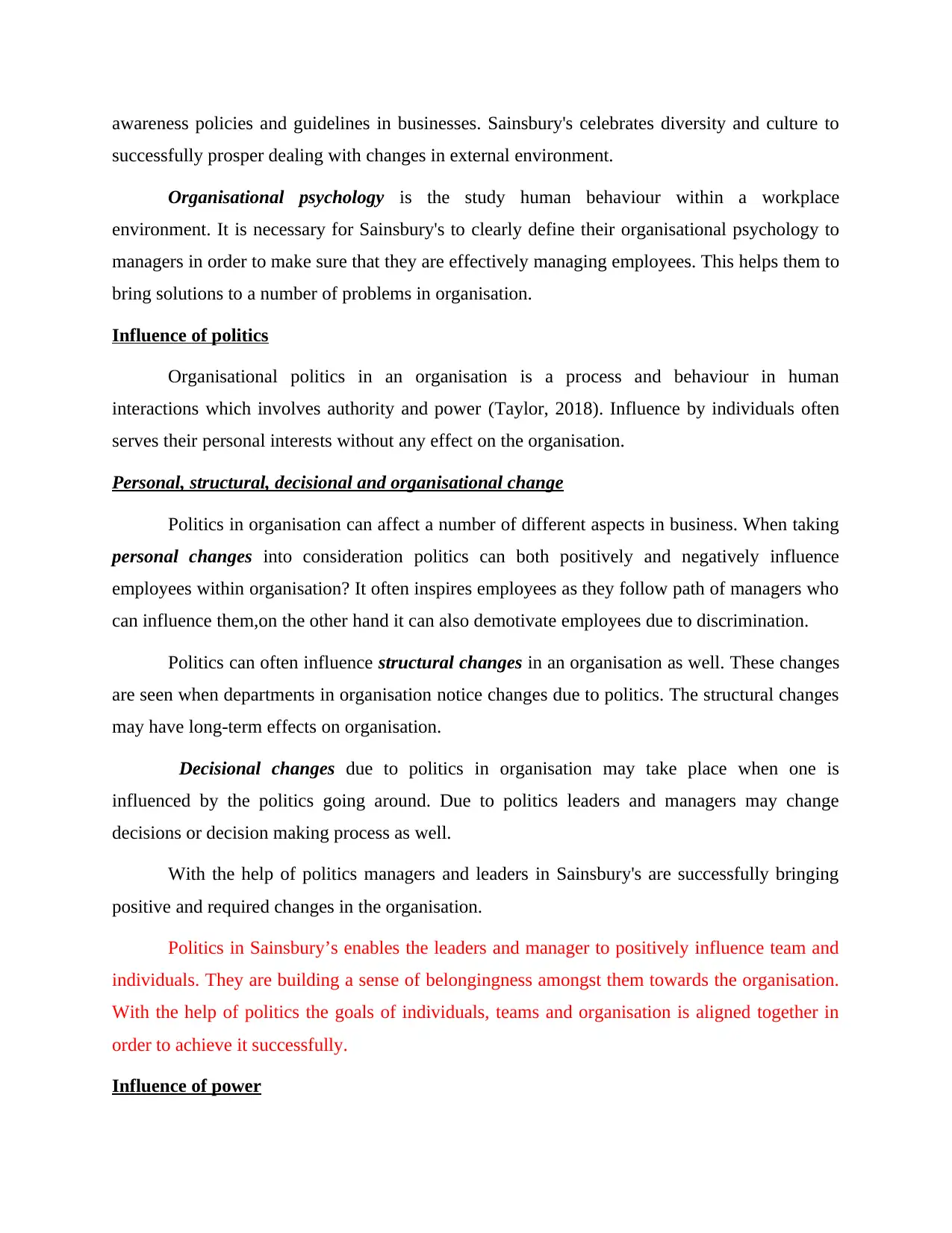
awareness policies and guidelines in businesses. Sainsbury's celebrates diversity and culture to
successfully prosper dealing with changes in external environment.
Organisational psychology is the study human behaviour within a workplace
environment. It is necessary for Sainsbury's to clearly define their organisational psychology to
managers in order to make sure that they are effectively managing employees. This helps them to
bring solutions to a number of problems in organisation.
Influence of politics
Organisational politics in an organisation is a process and behaviour in human
interactions which involves authority and power (Taylor, 2018). Influence by individuals often
serves their personal interests without any effect on the organisation.
Personal, structural, decisional and organisational change
Politics in organisation can affect a number of different aspects in business. When taking
personal changes into consideration politics can both positively and negatively influence
employees within organisation? It often inspires employees as they follow path of managers who
can influence them,on the other hand it can also demotivate employees due to discrimination.
Politics can often influence structural changes in an organisation as well. These changes
are seen when departments in organisation notice changes due to politics. The structural changes
may have long-term effects on organisation.
Decisional changes due to politics in organisation may take place when one is
influenced by the politics going around. Due to politics leaders and managers may change
decisions or decision making process as well.
With the help of politics managers and leaders in Sainsbury's are successfully bringing
positive and required changes in the organisation.
Politics in Sainsbury’s enables the leaders and manager to positively influence team and
individuals. They are building a sense of belongingness amongst them towards the organisation.
With the help of politics the goals of individuals, teams and organisation is aligned together in
order to achieve it successfully.
Influence of power
successfully prosper dealing with changes in external environment.
Organisational psychology is the study human behaviour within a workplace
environment. It is necessary for Sainsbury's to clearly define their organisational psychology to
managers in order to make sure that they are effectively managing employees. This helps them to
bring solutions to a number of problems in organisation.
Influence of politics
Organisational politics in an organisation is a process and behaviour in human
interactions which involves authority and power (Taylor, 2018). Influence by individuals often
serves their personal interests without any effect on the organisation.
Personal, structural, decisional and organisational change
Politics in organisation can affect a number of different aspects in business. When taking
personal changes into consideration politics can both positively and negatively influence
employees within organisation? It often inspires employees as they follow path of managers who
can influence them,on the other hand it can also demotivate employees due to discrimination.
Politics can often influence structural changes in an organisation as well. These changes
are seen when departments in organisation notice changes due to politics. The structural changes
may have long-term effects on organisation.
Decisional changes due to politics in organisation may take place when one is
influenced by the politics going around. Due to politics leaders and managers may change
decisions or decision making process as well.
With the help of politics managers and leaders in Sainsbury's are successfully bringing
positive and required changes in the organisation.
Politics in Sainsbury’s enables the leaders and manager to positively influence team and
individuals. They are building a sense of belongingness amongst them towards the organisation.
With the help of politics the goals of individuals, teams and organisation is aligned together in
order to achieve it successfully.
Influence of power
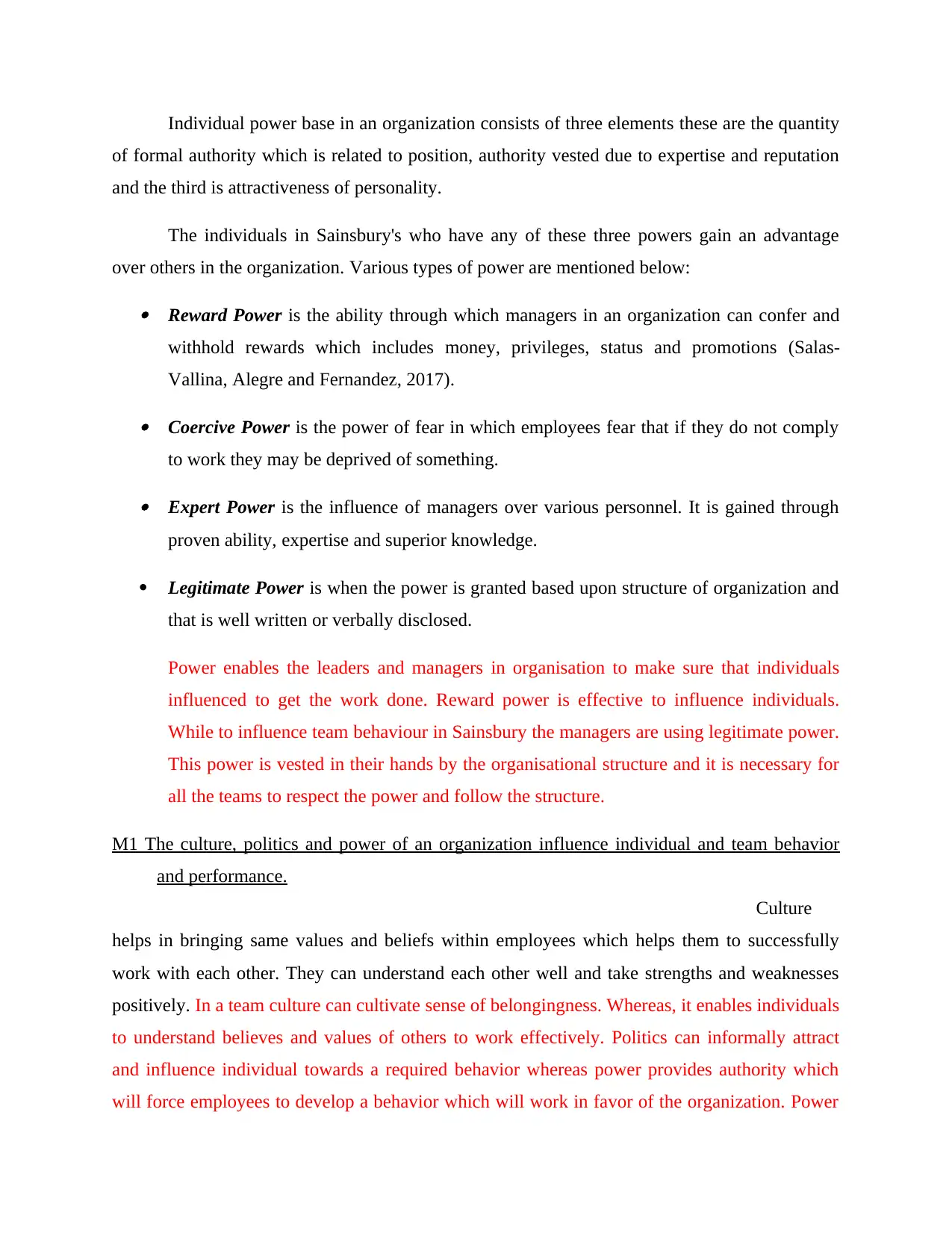
Individual power base in an organization consists of three elements these are the quantity
of formal authority which is related to position, authority vested due to expertise and reputation
and the third is attractiveness of personality.
The individuals in Sainsbury's who have any of these three powers gain an advantage
over others in the organization. Various types of power are mentioned below:
Reward Power is the ability through which managers in an organization can confer and
withhold rewards which includes money, privileges, status and promotions (Salas-
Vallina, Alegre and Fernandez, 2017).
Coercive Power is the power of fear in which employees fear that if they do not comply
to work they may be deprived of something.
Expert Power is the influence of managers over various personnel. It is gained through
proven ability, expertise and superior knowledge.
Legitimate Power is when the power is granted based upon structure of organization and
that is well written or verbally disclosed.
Power enables the leaders and managers in organisation to make sure that individuals
influenced to get the work done. Reward power is effective to influence individuals.
While to influence team behaviour in Sainsbury the managers are using legitimate power.
This power is vested in their hands by the organisational structure and it is necessary for
all the teams to respect the power and follow the structure.
M1 The culture, politics and power of an organization influence individual and team behavior
and performance.
Culture
helps in bringing same values and beliefs within employees which helps them to successfully
work with each other. They can understand each other well and take strengths and weaknesses
positively. In a team culture can cultivate sense of belongingness. Whereas, it enables individuals
to understand believes and values of others to work effectively. Politics can informally attract
and influence individual towards a required behavior whereas power provides authority which
will force employees to develop a behavior which will work in favor of the organization. Power
of formal authority which is related to position, authority vested due to expertise and reputation
and the third is attractiveness of personality.
The individuals in Sainsbury's who have any of these three powers gain an advantage
over others in the organization. Various types of power are mentioned below:
Reward Power is the ability through which managers in an organization can confer and
withhold rewards which includes money, privileges, status and promotions (Salas-
Vallina, Alegre and Fernandez, 2017).
Coercive Power is the power of fear in which employees fear that if they do not comply
to work they may be deprived of something.
Expert Power is the influence of managers over various personnel. It is gained through
proven ability, expertise and superior knowledge.
Legitimate Power is when the power is granted based upon structure of organization and
that is well written or verbally disclosed.
Power enables the leaders and managers in organisation to make sure that individuals
influenced to get the work done. Reward power is effective to influence individuals.
While to influence team behaviour in Sainsbury the managers are using legitimate power.
This power is vested in their hands by the organisational structure and it is necessary for
all the teams to respect the power and follow the structure.
M1 The culture, politics and power of an organization influence individual and team behavior
and performance.
Culture
helps in bringing same values and beliefs within employees which helps them to successfully
work with each other. They can understand each other well and take strengths and weaknesses
positively. In a team culture can cultivate sense of belongingness. Whereas, it enables individuals
to understand believes and values of others to work effectively. Politics can informally attract
and influence individual towards a required behavior whereas power provides authority which
will force employees to develop a behavior which will work in favor of the organization. Power
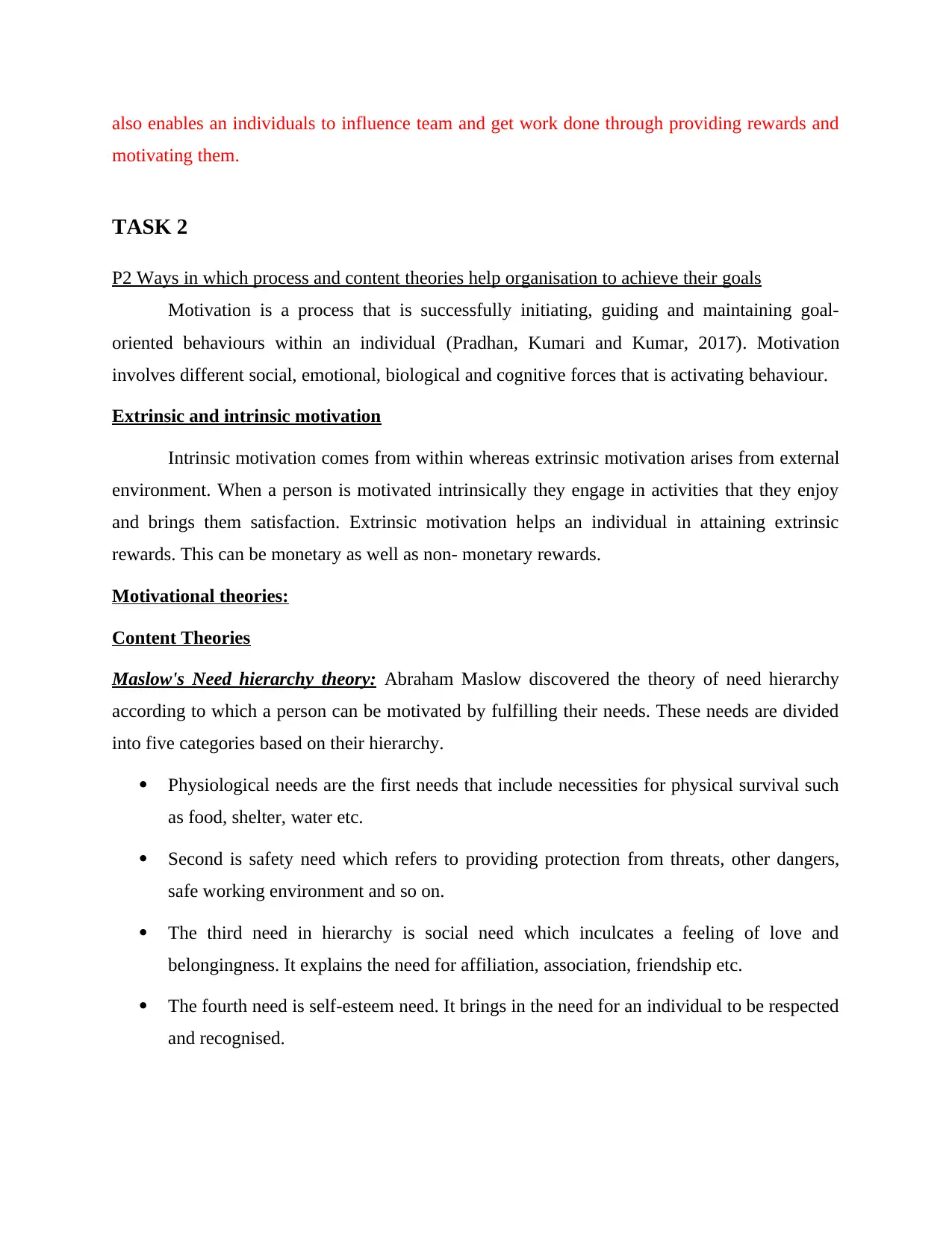
also enables an individuals to influence team and get work done through providing rewards and
motivating them.
TASK 2
P2 Ways in which process and content theories help organisation to achieve their goals
Motivation is a process that is successfully initiating, guiding and maintaining goal-
oriented behaviours within an individual (Pradhan, Kumari and Kumar, 2017). Motivation
involves different social, emotional, biological and cognitive forces that is activating behaviour.
Extrinsic and intrinsic motivation
Intrinsic motivation comes from within whereas extrinsic motivation arises from external
environment. When a person is motivated intrinsically they engage in activities that they enjoy
and brings them satisfaction. Extrinsic motivation helps an individual in attaining extrinsic
rewards. This can be monetary as well as non- monetary rewards.
Motivational theories:
Content Theories
Maslow's Need hierarchy theory: Abraham Maslow discovered the theory of need hierarchy
according to which a person can be motivated by fulfilling their needs. These needs are divided
into five categories based on their hierarchy.
Physiological needs are the first needs that include necessities for physical survival such
as food, shelter, water etc.
Second is safety need which refers to providing protection from threats, other dangers,
safe working environment and so on.
The third need in hierarchy is social need which inculcates a feeling of love and
belongingness. It explains the need for affiliation, association, friendship etc.
The fourth need is self-esteem need. It brings in the need for an individual to be respected
and recognised.
motivating them.
TASK 2
P2 Ways in which process and content theories help organisation to achieve their goals
Motivation is a process that is successfully initiating, guiding and maintaining goal-
oriented behaviours within an individual (Pradhan, Kumari and Kumar, 2017). Motivation
involves different social, emotional, biological and cognitive forces that is activating behaviour.
Extrinsic and intrinsic motivation
Intrinsic motivation comes from within whereas extrinsic motivation arises from external
environment. When a person is motivated intrinsically they engage in activities that they enjoy
and brings them satisfaction. Extrinsic motivation helps an individual in attaining extrinsic
rewards. This can be monetary as well as non- monetary rewards.
Motivational theories:
Content Theories
Maslow's Need hierarchy theory: Abraham Maslow discovered the theory of need hierarchy
according to which a person can be motivated by fulfilling their needs. These needs are divided
into five categories based on their hierarchy.
Physiological needs are the first needs that include necessities for physical survival such
as food, shelter, water etc.
Second is safety need which refers to providing protection from threats, other dangers,
safe working environment and so on.
The third need in hierarchy is social need which inculcates a feeling of love and
belongingness. It explains the need for affiliation, association, friendship etc.
The fourth need is self-esteem need. It brings in the need for an individual to be respected
and recognised.
Paraphrase This Document
Need a fresh take? Get an instant paraphrase of this document with our AI Paraphraser
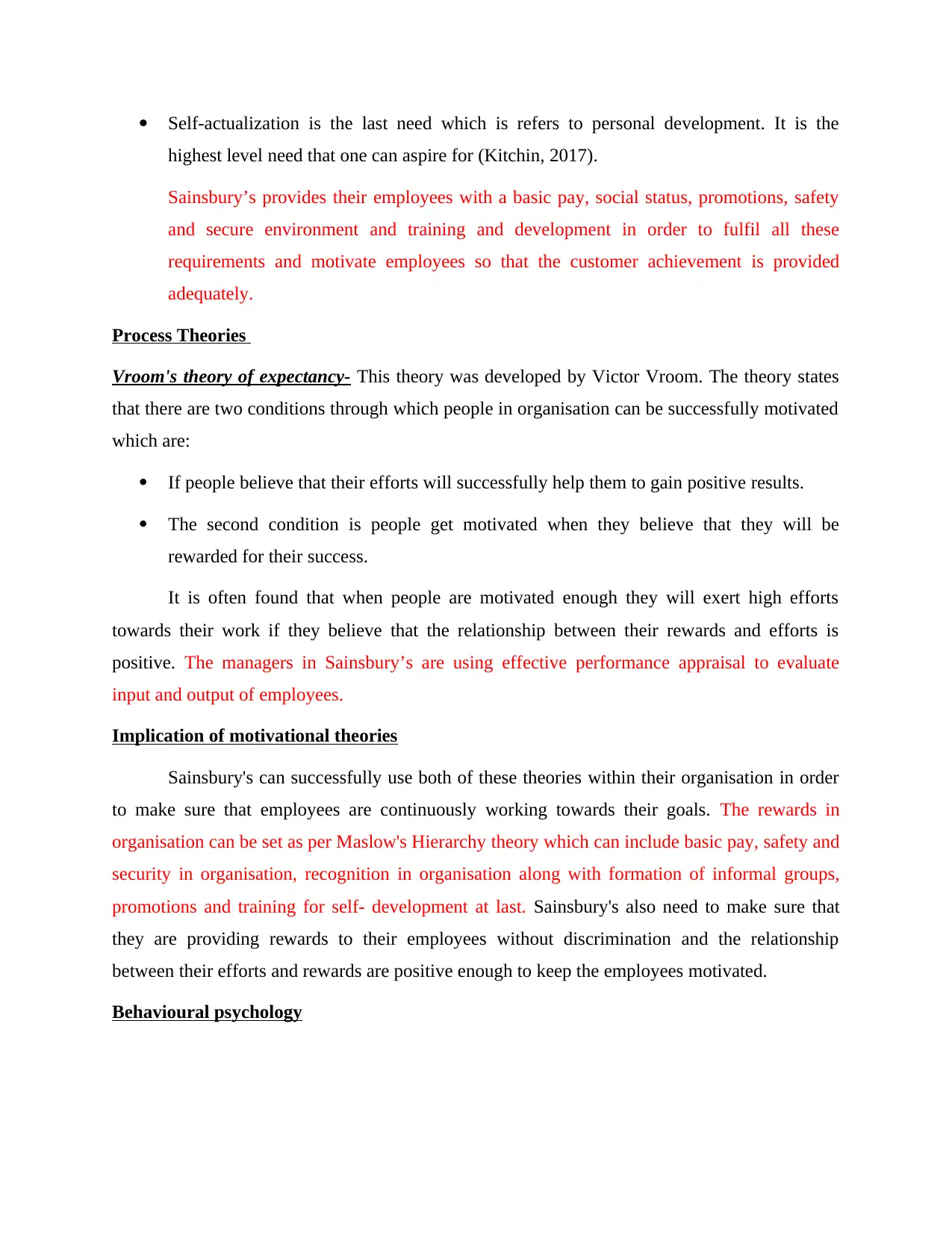
Self-actualization is the last need which is refers to personal development. It is the
highest level need that one can aspire for (Kitchin, 2017).
Sainsbury’s provides their employees with a basic pay, social status, promotions, safety
and secure environment and training and development in order to fulfil all these
requirements and motivate employees so that the customer achievement is provided
adequately.
Process Theories
Vroom's theory of expectancy- This theory was developed by Victor Vroom. The theory states
that there are two conditions through which people in organisation can be successfully motivated
which are:
If people believe that their efforts will successfully help them to gain positive results.
The second condition is people get motivated when they believe that they will be
rewarded for their success.
It is often found that when people are motivated enough they will exert high efforts
towards their work if they believe that the relationship between their rewards and efforts is
positive. The managers in Sainsbury’s are using effective performance appraisal to evaluate
input and output of employees.
Implication of motivational theories
Sainsbury's can successfully use both of these theories within their organisation in order
to make sure that employees are continuously working towards their goals. The rewards in
organisation can be set as per Maslow's Hierarchy theory which can include basic pay, safety and
security in organisation, recognition in organisation along with formation of informal groups,
promotions and training for self- development at last. Sainsbury's also need to make sure that
they are providing rewards to their employees without discrimination and the relationship
between their efforts and rewards are positive enough to keep the employees motivated.
Behavioural psychology
highest level need that one can aspire for (Kitchin, 2017).
Sainsbury’s provides their employees with a basic pay, social status, promotions, safety
and secure environment and training and development in order to fulfil all these
requirements and motivate employees so that the customer achievement is provided
adequately.
Process Theories
Vroom's theory of expectancy- This theory was developed by Victor Vroom. The theory states
that there are two conditions through which people in organisation can be successfully motivated
which are:
If people believe that their efforts will successfully help them to gain positive results.
The second condition is people get motivated when they believe that they will be
rewarded for their success.
It is often found that when people are motivated enough they will exert high efforts
towards their work if they believe that the relationship between their rewards and efforts is
positive. The managers in Sainsbury’s are using effective performance appraisal to evaluate
input and output of employees.
Implication of motivational theories
Sainsbury's can successfully use both of these theories within their organisation in order
to make sure that employees are continuously working towards their goals. The rewards in
organisation can be set as per Maslow's Hierarchy theory which can include basic pay, safety and
security in organisation, recognition in organisation along with formation of informal groups,
promotions and training for self- development at last. Sainsbury's also need to make sure that
they are providing rewards to their employees without discrimination and the relationship
between their efforts and rewards are positive enough to keep the employees motivated.
Behavioural psychology
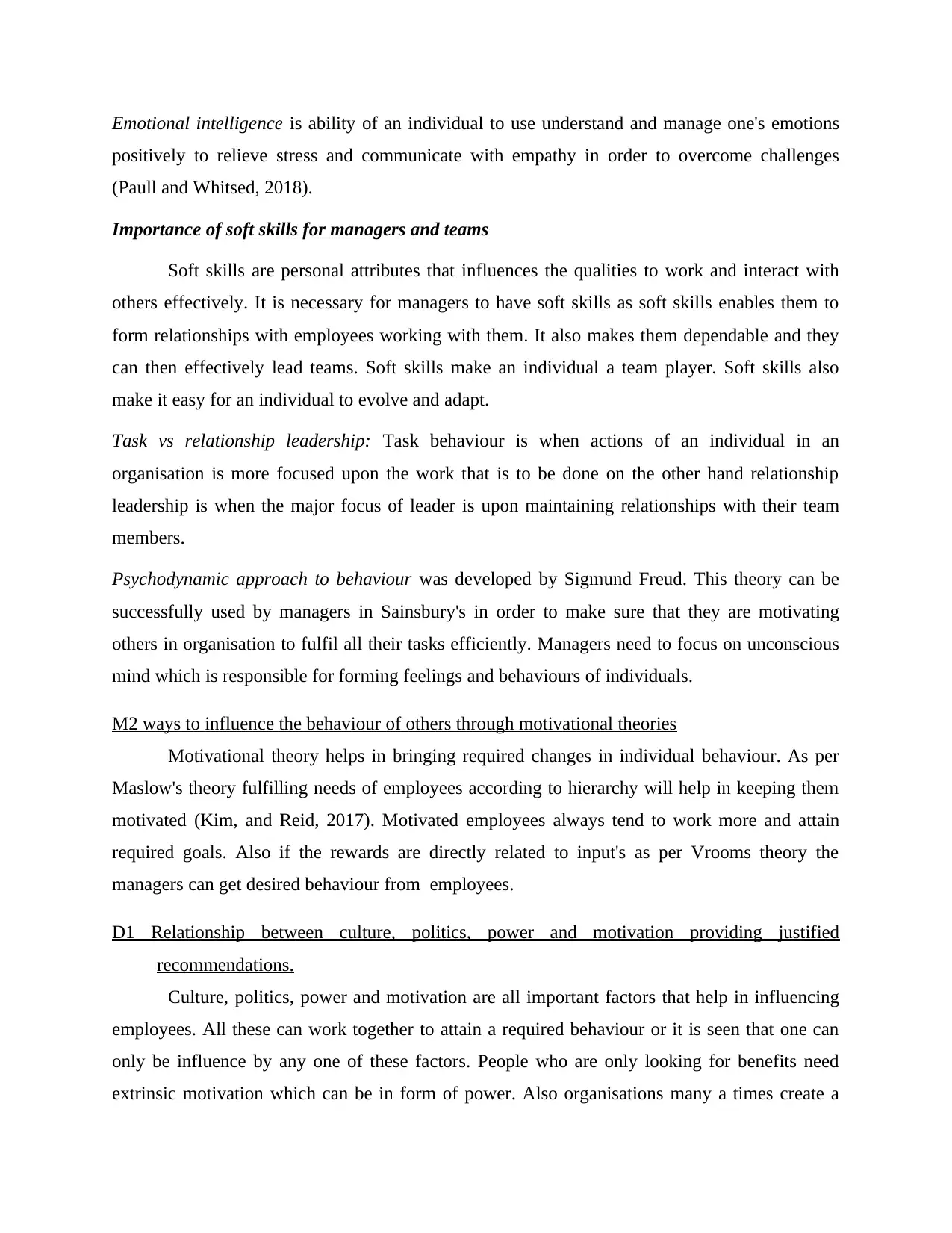
Emotional intelligence is ability of an individual to use understand and manage one's emotions
positively to relieve stress and communicate with empathy in order to overcome challenges
(Paull and Whitsed, 2018).
Importance of soft skills for managers and teams
Soft skills are personal attributes that influences the qualities to work and interact with
others effectively. It is necessary for managers to have soft skills as soft skills enables them to
form relationships with employees working with them. It also makes them dependable and they
can then effectively lead teams. Soft skills make an individual a team player. Soft skills also
make it easy for an individual to evolve and adapt.
Task vs relationship leadership: Task behaviour is when actions of an individual in an
organisation is more focused upon the work that is to be done on the other hand relationship
leadership is when the major focus of leader is upon maintaining relationships with their team
members.
Psychodynamic approach to behaviour was developed by Sigmund Freud. This theory can be
successfully used by managers in Sainsbury's in order to make sure that they are motivating
others in organisation to fulfil all their tasks efficiently. Managers need to focus on unconscious
mind which is responsible for forming feelings and behaviours of individuals.
M2 ways to influence the behaviour of others through motivational theories
Motivational theory helps in bringing required changes in individual behaviour. As per
Maslow's theory fulfilling needs of employees according to hierarchy will help in keeping them
motivated (Kim, and Reid, 2017). Motivated employees always tend to work more and attain
required goals. Also if the rewards are directly related to input's as per Vrooms theory the
managers can get desired behaviour from employees.
D1 Relationship between culture, politics, power and motivation providing justified
recommendations.
Culture, politics, power and motivation are all important factors that help in influencing
employees. All these can work together to attain a required behaviour or it is seen that one can
only be influence by any one of these factors. People who are only looking for benefits need
extrinsic motivation which can be in form of power. Also organisations many a times create a
positively to relieve stress and communicate with empathy in order to overcome challenges
(Paull and Whitsed, 2018).
Importance of soft skills for managers and teams
Soft skills are personal attributes that influences the qualities to work and interact with
others effectively. It is necessary for managers to have soft skills as soft skills enables them to
form relationships with employees working with them. It also makes them dependable and they
can then effectively lead teams. Soft skills make an individual a team player. Soft skills also
make it easy for an individual to evolve and adapt.
Task vs relationship leadership: Task behaviour is when actions of an individual in an
organisation is more focused upon the work that is to be done on the other hand relationship
leadership is when the major focus of leader is upon maintaining relationships with their team
members.
Psychodynamic approach to behaviour was developed by Sigmund Freud. This theory can be
successfully used by managers in Sainsbury's in order to make sure that they are motivating
others in organisation to fulfil all their tasks efficiently. Managers need to focus on unconscious
mind which is responsible for forming feelings and behaviours of individuals.
M2 ways to influence the behaviour of others through motivational theories
Motivational theory helps in bringing required changes in individual behaviour. As per
Maslow's theory fulfilling needs of employees according to hierarchy will help in keeping them
motivated (Kim, and Reid, 2017). Motivated employees always tend to work more and attain
required goals. Also if the rewards are directly related to input's as per Vrooms theory the
managers can get desired behaviour from employees.
D1 Relationship between culture, politics, power and motivation providing justified
recommendations.
Culture, politics, power and motivation are all important factors that help in influencing
employees. All these can work together to attain a required behaviour or it is seen that one can
only be influence by any one of these factors. People who are only looking for benefits need
extrinsic motivation which can be in form of power. Also organisations many a times create a
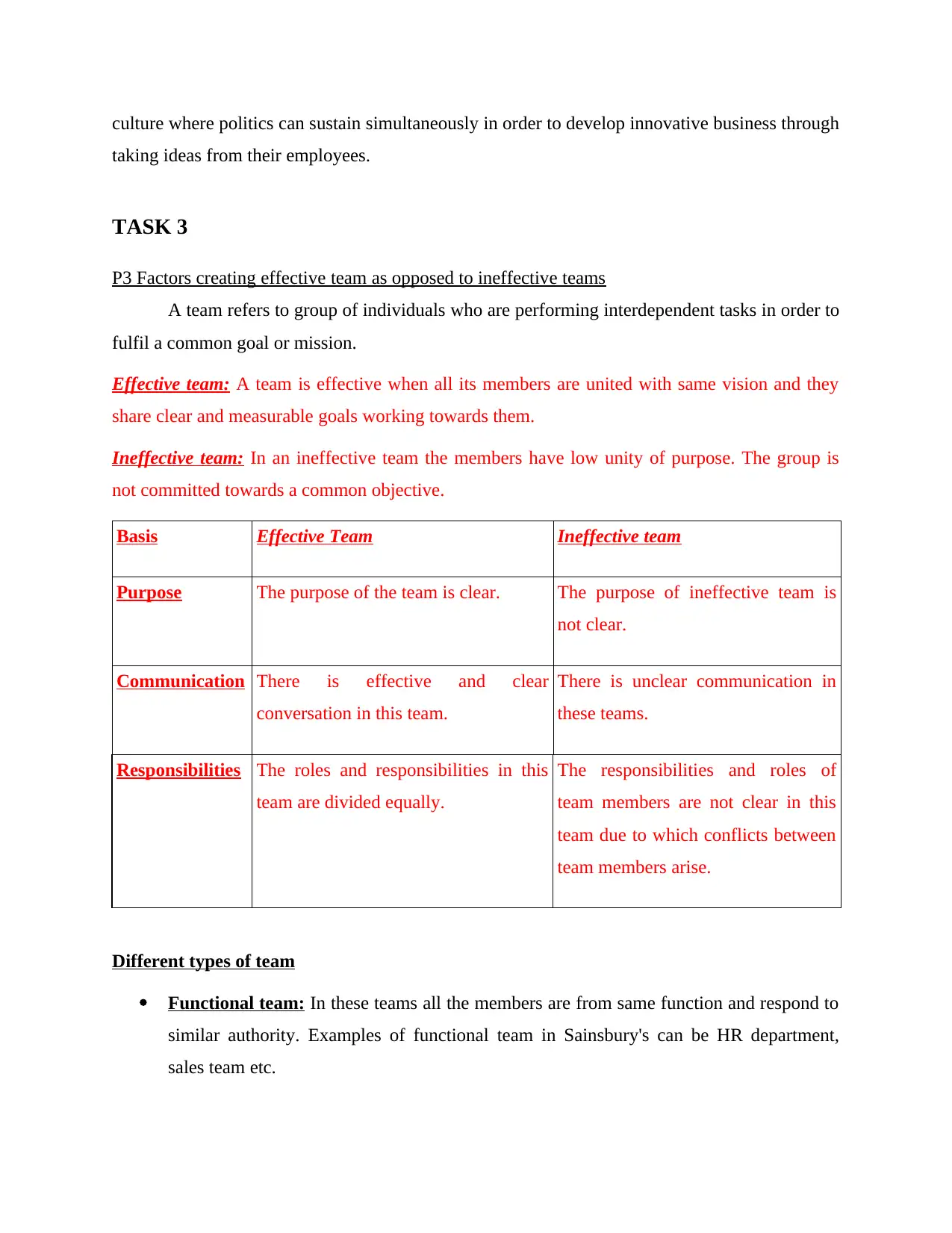
culture where politics can sustain simultaneously in order to develop innovative business through
taking ideas from their employees.
TASK 3
P3 Factors creating effective team as opposed to ineffective teams
A team refers to group of individuals who are performing interdependent tasks in order to
fulfil a common goal or mission.
Effective team: A team is effective when all its members are united with same vision and they
share clear and measurable goals working towards them.
Ineffective team: In an ineffective team the members have low unity of purpose. The group is
not committed towards a common objective.
Basis Effective Team Ineffective team
Purpose The purpose of the team is clear. The purpose of ineffective team is
not clear.
Communication There is effective and clear
conversation in this team.
There is unclear communication in
these teams.
Responsibilities The roles and responsibilities in this
team are divided equally.
The responsibilities and roles of
team members are not clear in this
team due to which conflicts between
team members arise.
Different types of team
Functional team: In these teams all the members are from same function and respond to
similar authority. Examples of functional team in Sainsbury's can be HR department,
sales team etc.
taking ideas from their employees.
TASK 3
P3 Factors creating effective team as opposed to ineffective teams
A team refers to group of individuals who are performing interdependent tasks in order to
fulfil a common goal or mission.
Effective team: A team is effective when all its members are united with same vision and they
share clear and measurable goals working towards them.
Ineffective team: In an ineffective team the members have low unity of purpose. The group is
not committed towards a common objective.
Basis Effective Team Ineffective team
Purpose The purpose of the team is clear. The purpose of ineffective team is
not clear.
Communication There is effective and clear
conversation in this team.
There is unclear communication in
these teams.
Responsibilities The roles and responsibilities in this
team are divided equally.
The responsibilities and roles of
team members are not clear in this
team due to which conflicts between
team members arise.
Different types of team
Functional team: In these teams all the members are from same function and respond to
similar authority. Examples of functional team in Sainsbury's can be HR department,
sales team etc.
Secure Best Marks with AI Grader
Need help grading? Try our AI Grader for instant feedback on your assignments.
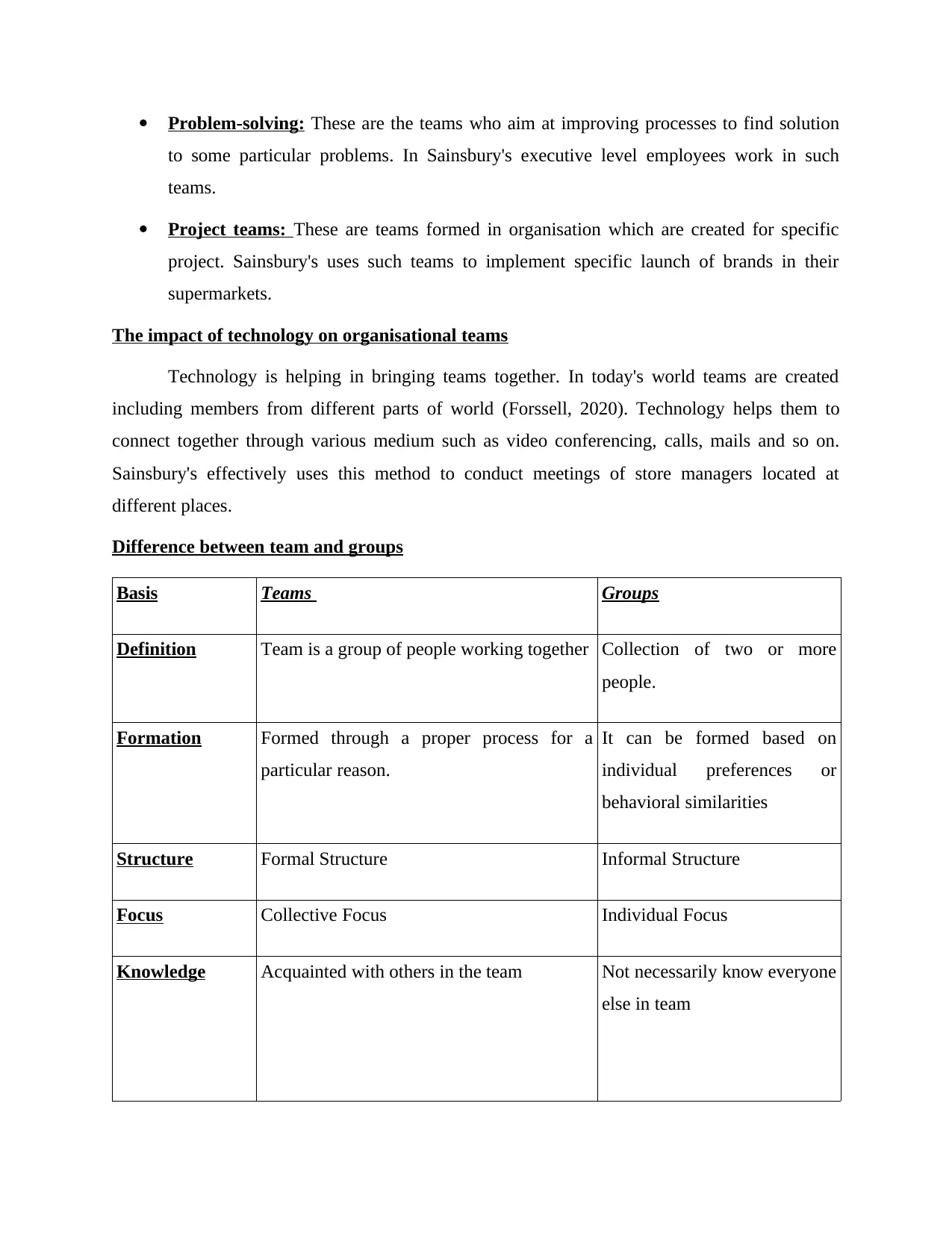
Problem-solving: These are the teams who aim at improving processes to find solution
to some particular problems. In Sainsbury's executive level employees work in such
teams.
Project teams: These are teams formed in organisation which are created for specific
project. Sainsbury's uses such teams to implement specific launch of brands in their
supermarkets.
The impact of technology on organisational teams
Technology is helping in bringing teams together. In today's world teams are created
including members from different parts of world (Forssell, 2020). Technology helps them to
connect together through various medium such as video conferencing, calls, mails and so on.
Sainsbury's effectively uses this method to conduct meetings of store managers located at
different places.
Difference between team and groups
Basis Teams Groups
Definition Team is a group of people working together Collection of two or more
people.
Formation Formed through a proper process for a
particular reason.
It can be formed based on
individual preferences or
behavioral similarities
Structure Formal Structure Informal Structure
Focus Collective Focus Individual Focus
Knowledge Acquainted with others in the team Not necessarily know everyone
else in team
to some particular problems. In Sainsbury's executive level employees work in such
teams.
Project teams: These are teams formed in organisation which are created for specific
project. Sainsbury's uses such teams to implement specific launch of brands in their
supermarkets.
The impact of technology on organisational teams
Technology is helping in bringing teams together. In today's world teams are created
including members from different parts of world (Forssell, 2020). Technology helps them to
connect together through various medium such as video conferencing, calls, mails and so on.
Sainsbury's effectively uses this method to conduct meetings of store managers located at
different places.
Difference between team and groups
Basis Teams Groups
Definition Team is a group of people working together Collection of two or more
people.
Formation Formed through a proper process for a
particular reason.
It can be formed based on
individual preferences or
behavioral similarities
Structure Formal Structure Informal Structure
Focus Collective Focus Individual Focus
Knowledge Acquainted with others in the team Not necessarily know everyone
else in team
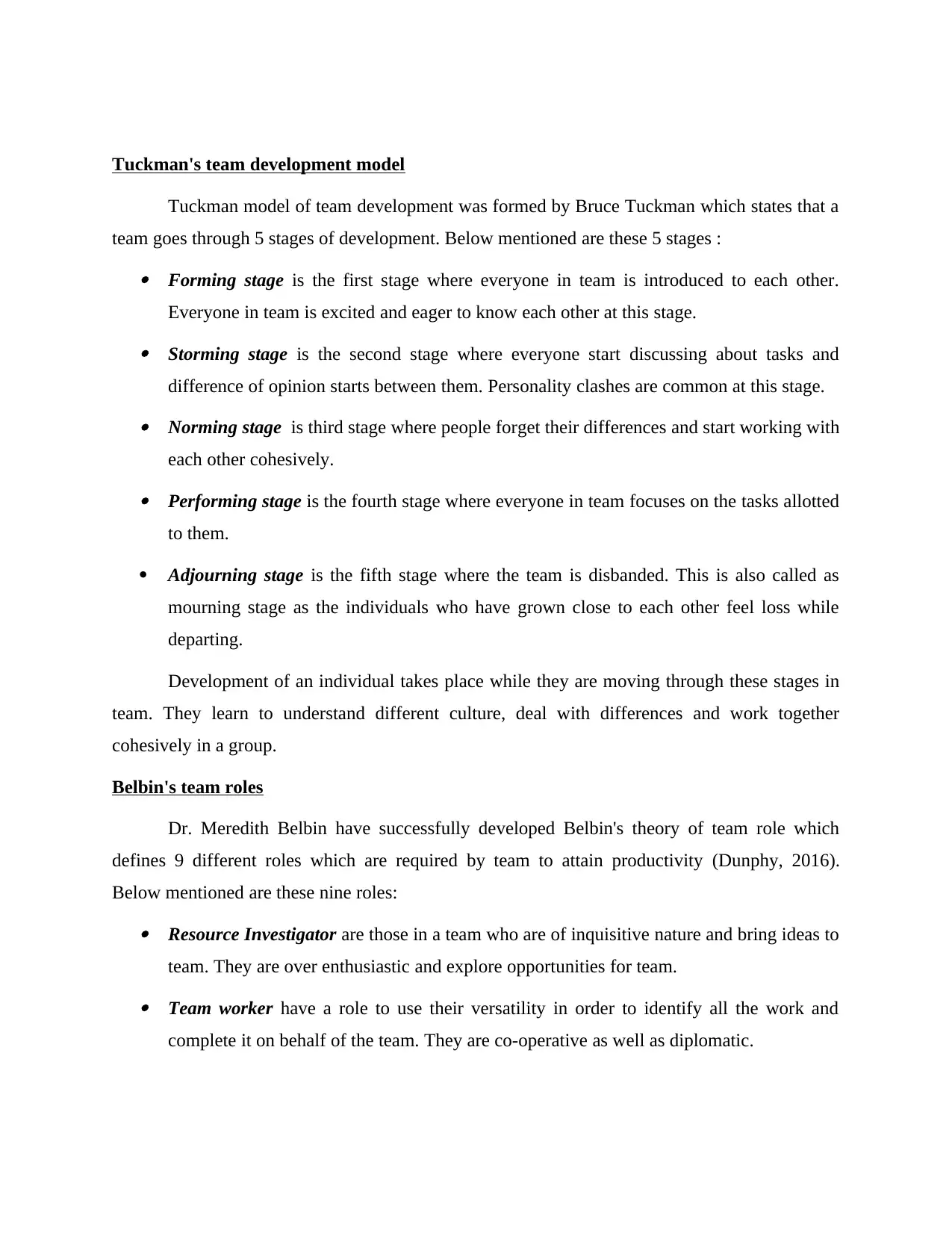
Tuckman's team development model
Tuckman model of team development was formed by Bruce Tuckman which states that a
team goes through 5 stages of development. Below mentioned are these 5 stages : Forming stage is the first stage where everyone in team is introduced to each other.
Everyone in team is excited and eager to know each other at this stage. Storming stage is the second stage where everyone start discussing about tasks and
difference of opinion starts between them. Personality clashes are common at this stage. Norming stage is third stage where people forget their differences and start working with
each other cohesively. Performing stage is the fourth stage where everyone in team focuses on the tasks allotted
to them.
Adjourning stage is the fifth stage where the team is disbanded. This is also called as
mourning stage as the individuals who have grown close to each other feel loss while
departing.
Development of an individual takes place while they are moving through these stages in
team. They learn to understand different culture, deal with differences and work together
cohesively in a group.
Belbin's team roles
Dr. Meredith Belbin have successfully developed Belbin's theory of team role which
defines 9 different roles which are required by team to attain productivity (Dunphy, 2016).
Below mentioned are these nine roles: Resource Investigator are those in a team who are of inquisitive nature and bring ideas to
team. They are over enthusiastic and explore opportunities for team. Team worker have a role to use their versatility in order to identify all the work and
complete it on behalf of the team. They are co-operative as well as diplomatic.
Tuckman model of team development was formed by Bruce Tuckman which states that a
team goes through 5 stages of development. Below mentioned are these 5 stages : Forming stage is the first stage where everyone in team is introduced to each other.
Everyone in team is excited and eager to know each other at this stage. Storming stage is the second stage where everyone start discussing about tasks and
difference of opinion starts between them. Personality clashes are common at this stage. Norming stage is third stage where people forget their differences and start working with
each other cohesively. Performing stage is the fourth stage where everyone in team focuses on the tasks allotted
to them.
Adjourning stage is the fifth stage where the team is disbanded. This is also called as
mourning stage as the individuals who have grown close to each other feel loss while
departing.
Development of an individual takes place while they are moving through these stages in
team. They learn to understand different culture, deal with differences and work together
cohesively in a group.
Belbin's team roles
Dr. Meredith Belbin have successfully developed Belbin's theory of team role which
defines 9 different roles which are required by team to attain productivity (Dunphy, 2016).
Below mentioned are these nine roles: Resource Investigator are those in a team who are of inquisitive nature and bring ideas to
team. They are over enthusiastic and explore opportunities for team. Team worker have a role to use their versatility in order to identify all the work and
complete it on behalf of the team. They are co-operative as well as diplomatic.
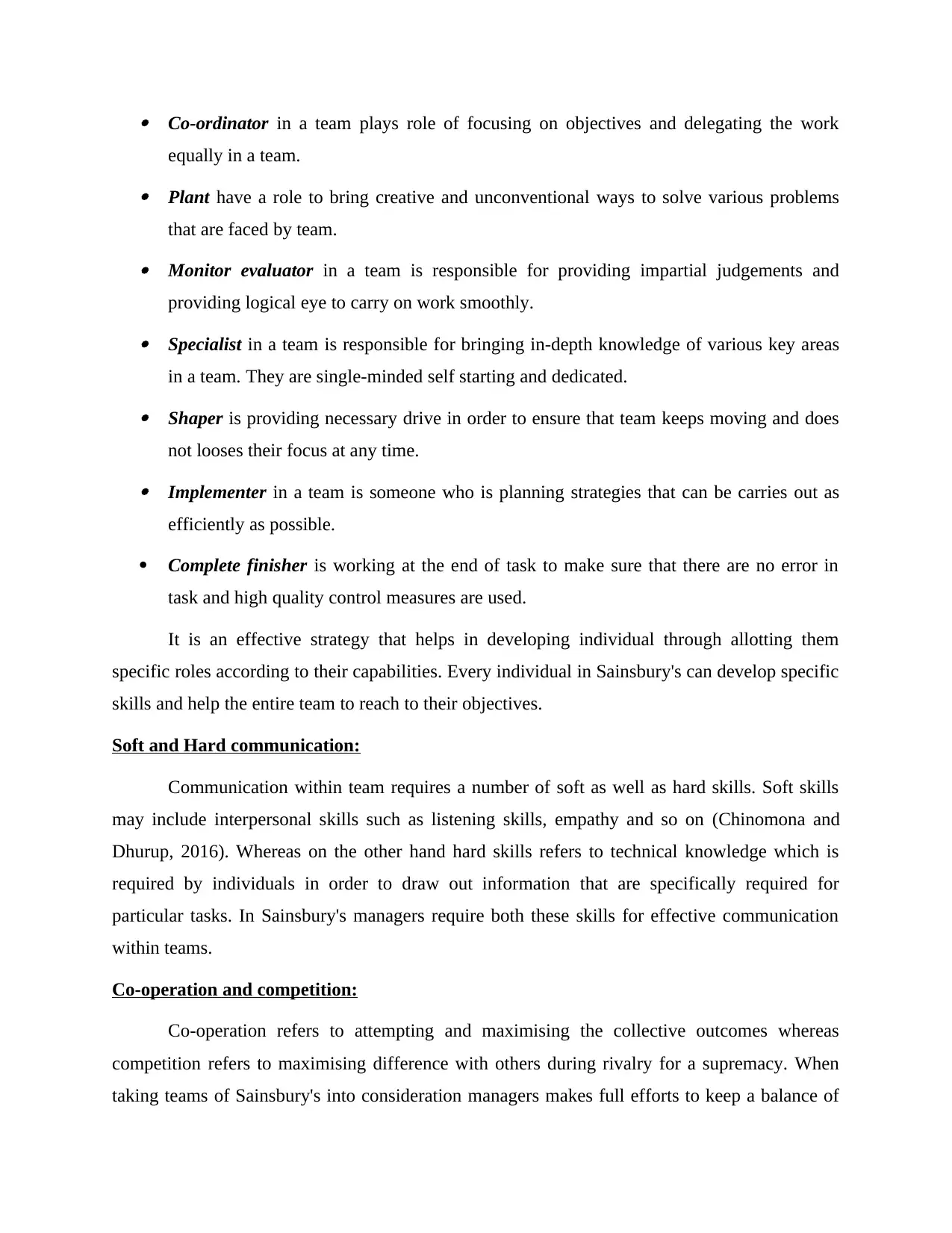
Co-ordinator in a team plays role of focusing on objectives and delegating the work
equally in a team. Plant have a role to bring creative and unconventional ways to solve various problems
that are faced by team. Monitor evaluator in a team is responsible for providing impartial judgements and
providing logical eye to carry on work smoothly. Specialist in a team is responsible for bringing in-depth knowledge of various key areas
in a team. They are single-minded self starting and dedicated. Shaper is providing necessary drive in order to ensure that team keeps moving and does
not looses their focus at any time. Implementer in a team is someone who is planning strategies that can be carries out as
efficiently as possible.
Complete finisher is working at the end of task to make sure that there are no error in
task and high quality control measures are used.
It is an effective strategy that helps in developing individual through allotting them
specific roles according to their capabilities. Every individual in Sainsbury's can develop specific
skills and help the entire team to reach to their objectives.
Soft and Hard communication:
Communication within team requires a number of soft as well as hard skills. Soft skills
may include interpersonal skills such as listening skills, empathy and so on (Chinomona and
Dhurup, 2016). Whereas on the other hand hard skills refers to technical knowledge which is
required by individuals in order to draw out information that are specifically required for
particular tasks. In Sainsbury's managers require both these skills for effective communication
within teams.
Co-operation and competition:
Co-operation refers to attempting and maximising the collective outcomes whereas
competition refers to maximising difference with others during rivalry for a supremacy. When
taking teams of Sainsbury's into consideration managers makes full efforts to keep a balance of
equally in a team. Plant have a role to bring creative and unconventional ways to solve various problems
that are faced by team. Monitor evaluator in a team is responsible for providing impartial judgements and
providing logical eye to carry on work smoothly. Specialist in a team is responsible for bringing in-depth knowledge of various key areas
in a team. They are single-minded self starting and dedicated. Shaper is providing necessary drive in order to ensure that team keeps moving and does
not looses their focus at any time. Implementer in a team is someone who is planning strategies that can be carries out as
efficiently as possible.
Complete finisher is working at the end of task to make sure that there are no error in
task and high quality control measures are used.
It is an effective strategy that helps in developing individual through allotting them
specific roles according to their capabilities. Every individual in Sainsbury's can develop specific
skills and help the entire team to reach to their objectives.
Soft and Hard communication:
Communication within team requires a number of soft as well as hard skills. Soft skills
may include interpersonal skills such as listening skills, empathy and so on (Chinomona and
Dhurup, 2016). Whereas on the other hand hard skills refers to technical knowledge which is
required by individuals in order to draw out information that are specifically required for
particular tasks. In Sainsbury's managers require both these skills for effective communication
within teams.
Co-operation and competition:
Co-operation refers to attempting and maximising the collective outcomes whereas
competition refers to maximising difference with others during rivalry for a supremacy. When
taking teams of Sainsbury's into consideration managers makes full efforts to keep a balance of
Paraphrase This Document
Need a fresh take? Get an instant paraphrase of this document with our AI Paraphraser
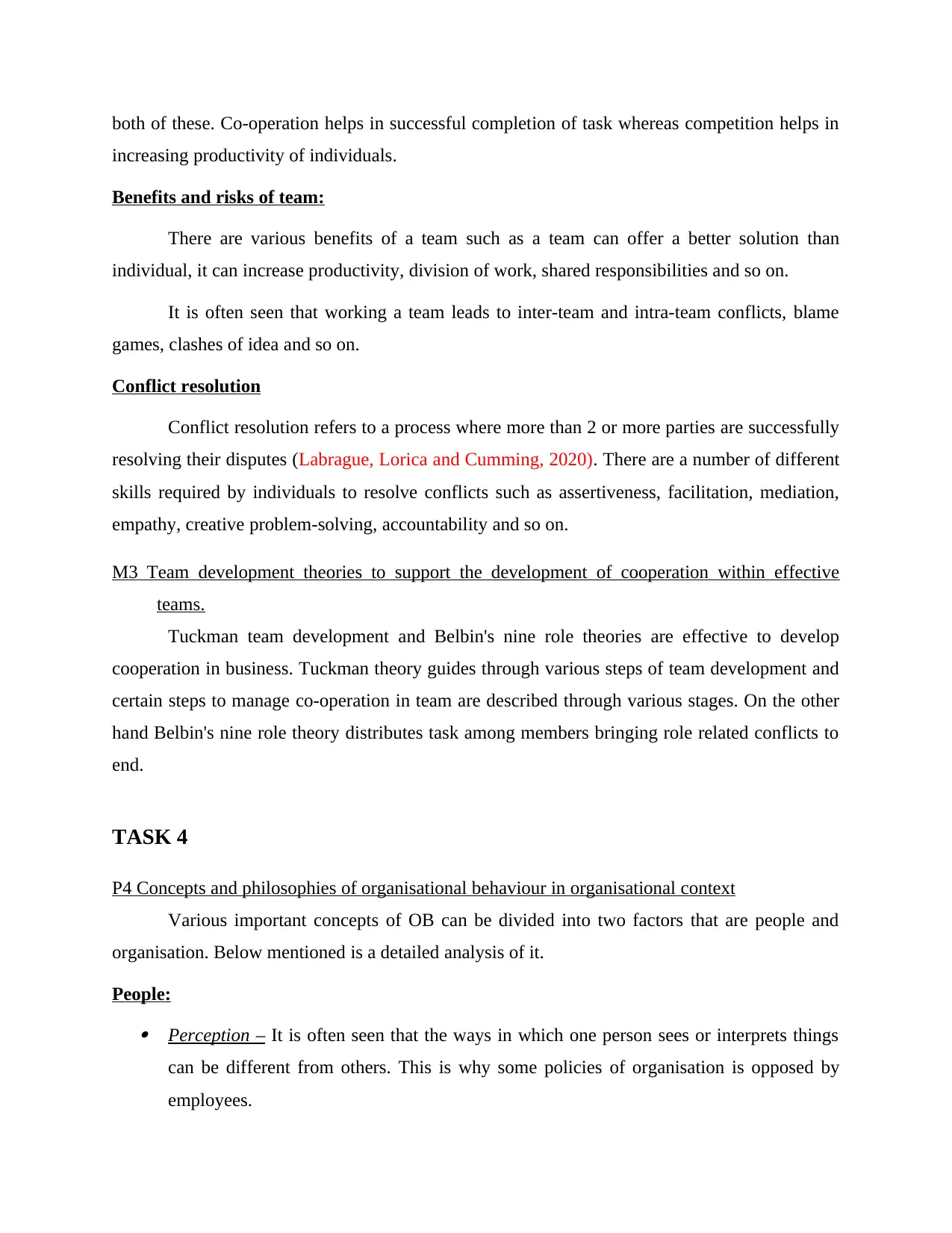
both of these. Co-operation helps in successful completion of task whereas competition helps in
increasing productivity of individuals.
Benefits and risks of team:
There are various benefits of a team such as a team can offer a better solution than
individual, it can increase productivity, division of work, shared responsibilities and so on.
It is often seen that working a team leads to inter-team and intra-team conflicts, blame
games, clashes of idea and so on.
Conflict resolution
Conflict resolution refers to a process where more than 2 or more parties are successfully
resolving their disputes (Labrague, Lorica and Cumming, 2020). There are a number of different
skills required by individuals to resolve conflicts such as assertiveness, facilitation, mediation,
empathy, creative problem-solving, accountability and so on.
M3 Team development theories to support the development of cooperation within effective
teams.
Tuckman team development and Belbin's nine role theories are effective to develop
cooperation in business. Tuckman theory guides through various steps of team development and
certain steps to manage co-operation in team are described through various stages. On the other
hand Belbin's nine role theory distributes task among members bringing role related conflicts to
end.
TASK 4
P4 Concepts and philosophies of organisational behaviour in organisational context
Various important concepts of OB can be divided into two factors that are people and
organisation. Below mentioned is a detailed analysis of it.
People: Perception – It is often seen that the ways in which one person sees or interprets things
can be different from others. This is why some policies of organisation is opposed by
employees.
increasing productivity of individuals.
Benefits and risks of team:
There are various benefits of a team such as a team can offer a better solution than
individual, it can increase productivity, division of work, shared responsibilities and so on.
It is often seen that working a team leads to inter-team and intra-team conflicts, blame
games, clashes of idea and so on.
Conflict resolution
Conflict resolution refers to a process where more than 2 or more parties are successfully
resolving their disputes (Labrague, Lorica and Cumming, 2020). There are a number of different
skills required by individuals to resolve conflicts such as assertiveness, facilitation, mediation,
empathy, creative problem-solving, accountability and so on.
M3 Team development theories to support the development of cooperation within effective
teams.
Tuckman team development and Belbin's nine role theories are effective to develop
cooperation in business. Tuckman theory guides through various steps of team development and
certain steps to manage co-operation in team are described through various stages. On the other
hand Belbin's nine role theory distributes task among members bringing role related conflicts to
end.
TASK 4
P4 Concepts and philosophies of organisational behaviour in organisational context
Various important concepts of OB can be divided into two factors that are people and
organisation. Below mentioned is a detailed analysis of it.
People: Perception – It is often seen that the ways in which one person sees or interprets things
can be different from others. This is why some policies of organisation is opposed by
employees.
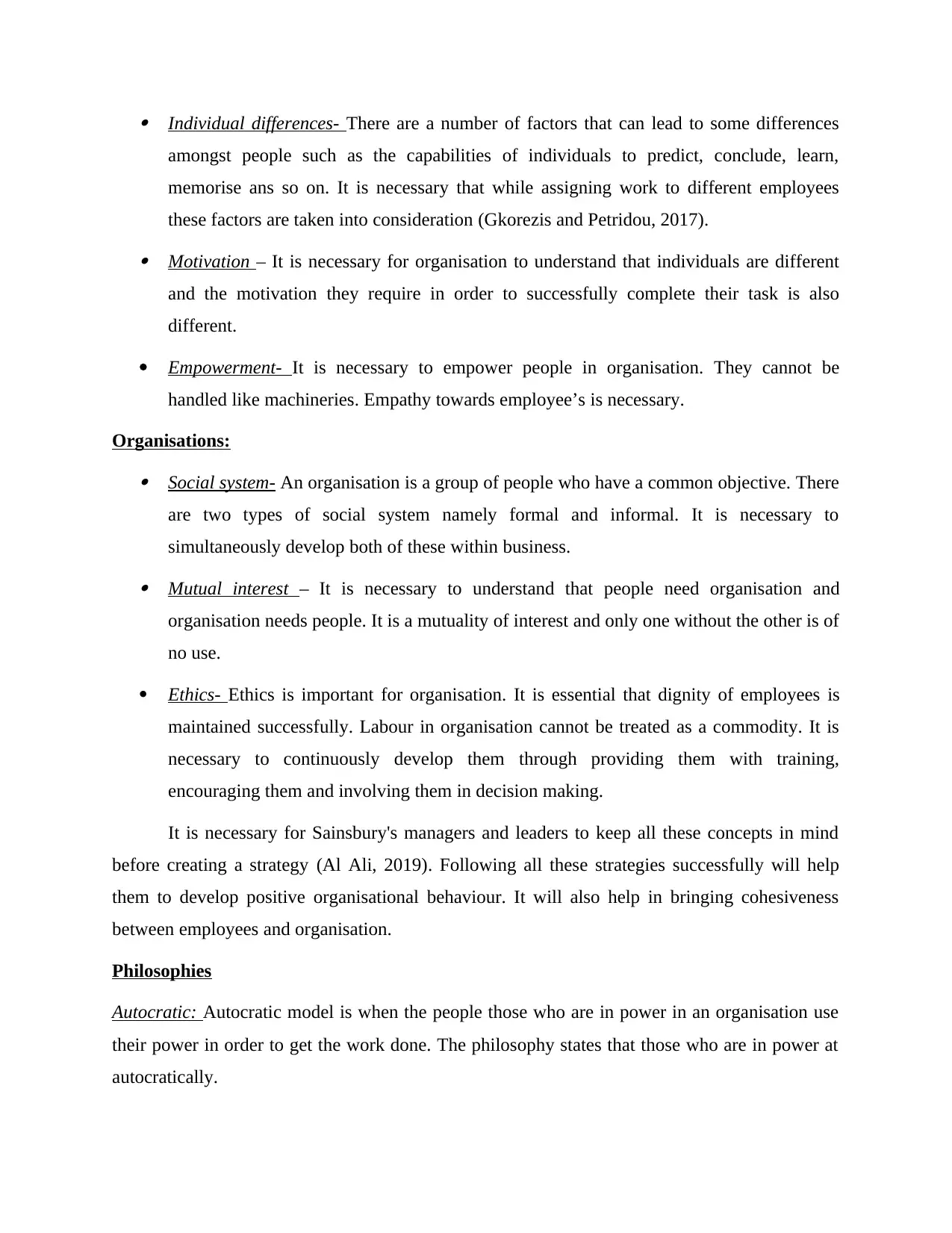
Individual differences- There are a number of factors that can lead to some differences
amongst people such as the capabilities of individuals to predict, conclude, learn,
memorise ans so on. It is necessary that while assigning work to different employees
these factors are taken into consideration (Gkorezis and Petridou, 2017). Motivation – It is necessary for organisation to understand that individuals are different
and the motivation they require in order to successfully complete their task is also
different.
Empowerment- It is necessary to empower people in organisation. They cannot be
handled like machineries. Empathy towards employee’s is necessary.
Organisations: Social system- An organisation is a group of people who have a common objective. There
are two types of social system namely formal and informal. It is necessary to
simultaneously develop both of these within business. Mutual interest – It is necessary to understand that people need organisation and
organisation needs people. It is a mutuality of interest and only one without the other is of
no use.
Ethics- Ethics is important for organisation. It is essential that dignity of employees is
maintained successfully. Labour in organisation cannot be treated as a commodity. It is
necessary to continuously develop them through providing them with training,
encouraging them and involving them in decision making.
It is necessary for Sainsbury's managers and leaders to keep all these concepts in mind
before creating a strategy (Al Ali, 2019). Following all these strategies successfully will help
them to develop positive organisational behaviour. It will also help in bringing cohesiveness
between employees and organisation.
Philosophies
Autocratic: Autocratic model is when the people those who are in power in an organisation use
their power in order to get the work done. The philosophy states that those who are in power at
autocratically.
amongst people such as the capabilities of individuals to predict, conclude, learn,
memorise ans so on. It is necessary that while assigning work to different employees
these factors are taken into consideration (Gkorezis and Petridou, 2017). Motivation – It is necessary for organisation to understand that individuals are different
and the motivation they require in order to successfully complete their task is also
different.
Empowerment- It is necessary to empower people in organisation. They cannot be
handled like machineries. Empathy towards employee’s is necessary.
Organisations: Social system- An organisation is a group of people who have a common objective. There
are two types of social system namely formal and informal. It is necessary to
simultaneously develop both of these within business. Mutual interest – It is necessary to understand that people need organisation and
organisation needs people. It is a mutuality of interest and only one without the other is of
no use.
Ethics- Ethics is important for organisation. It is essential that dignity of employees is
maintained successfully. Labour in organisation cannot be treated as a commodity. It is
necessary to continuously develop them through providing them with training,
encouraging them and involving them in decision making.
It is necessary for Sainsbury's managers and leaders to keep all these concepts in mind
before creating a strategy (Al Ali, 2019). Following all these strategies successfully will help
them to develop positive organisational behaviour. It will also help in bringing cohesiveness
between employees and organisation.
Philosophies
Autocratic: Autocratic model is when the people those who are in power in an organisation use
their power in order to get the work done. The philosophy states that those who are in power at
autocratically.
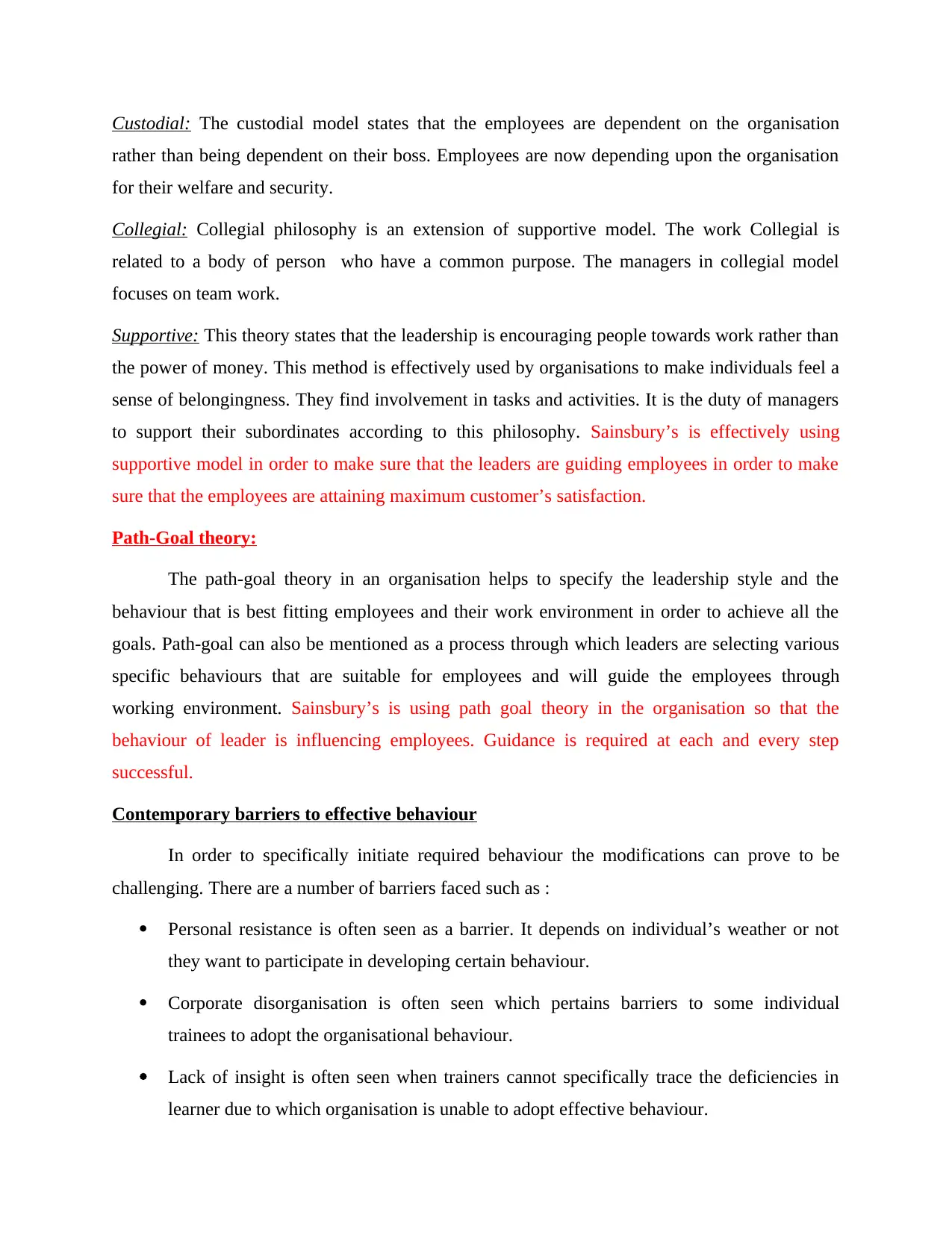
Custodial: The custodial model states that the employees are dependent on the organisation
rather than being dependent on their boss. Employees are now depending upon the organisation
for their welfare and security.
Collegial: Collegial philosophy is an extension of supportive model. The work Collegial is
related to a body of person who have a common purpose. The managers in collegial model
focuses on team work.
Supportive: This theory states that the leadership is encouraging people towards work rather than
the power of money. This method is effectively used by organisations to make individuals feel a
sense of belongingness. They find involvement in tasks and activities. It is the duty of managers
to support their subordinates according to this philosophy. Sainsbury’s is effectively using
supportive model in order to make sure that the leaders are guiding employees in order to make
sure that the employees are attaining maximum customer’s satisfaction.
Path-Goal theory:
The path-goal theory in an organisation helps to specify the leadership style and the
behaviour that is best fitting employees and their work environment in order to achieve all the
goals. Path-goal can also be mentioned as a process through which leaders are selecting various
specific behaviours that are suitable for employees and will guide the employees through
working environment. Sainsbury’s is using path goal theory in the organisation so that the
behaviour of leader is influencing employees. Guidance is required at each and every step
successful.
Contemporary barriers to effective behaviour
In order to specifically initiate required behaviour the modifications can prove to be
challenging. There are a number of barriers faced such as :
Personal resistance is often seen as a barrier. It depends on individual’s weather or not
they want to participate in developing certain behaviour.
Corporate disorganisation is often seen which pertains barriers to some individual
trainees to adopt the organisational behaviour.
Lack of insight is often seen when trainers cannot specifically trace the deficiencies in
learner due to which organisation is unable to adopt effective behaviour.
rather than being dependent on their boss. Employees are now depending upon the organisation
for their welfare and security.
Collegial: Collegial philosophy is an extension of supportive model. The work Collegial is
related to a body of person who have a common purpose. The managers in collegial model
focuses on team work.
Supportive: This theory states that the leadership is encouraging people towards work rather than
the power of money. This method is effectively used by organisations to make individuals feel a
sense of belongingness. They find involvement in tasks and activities. It is the duty of managers
to support their subordinates according to this philosophy. Sainsbury’s is effectively using
supportive model in order to make sure that the leaders are guiding employees in order to make
sure that the employees are attaining maximum customer’s satisfaction.
Path-Goal theory:
The path-goal theory in an organisation helps to specify the leadership style and the
behaviour that is best fitting employees and their work environment in order to achieve all the
goals. Path-goal can also be mentioned as a process through which leaders are selecting various
specific behaviours that are suitable for employees and will guide the employees through
working environment. Sainsbury’s is using path goal theory in the organisation so that the
behaviour of leader is influencing employees. Guidance is required at each and every step
successful.
Contemporary barriers to effective behaviour
In order to specifically initiate required behaviour the modifications can prove to be
challenging. There are a number of barriers faced such as :
Personal resistance is often seen as a barrier. It depends on individual’s weather or not
they want to participate in developing certain behaviour.
Corporate disorganisation is often seen which pertains barriers to some individual
trainees to adopt the organisational behaviour.
Lack of insight is often seen when trainers cannot specifically trace the deficiencies in
learner due to which organisation is unable to adopt effective behaviour.
Secure Best Marks with AI Grader
Need help grading? Try our AI Grader for instant feedback on your assignments.
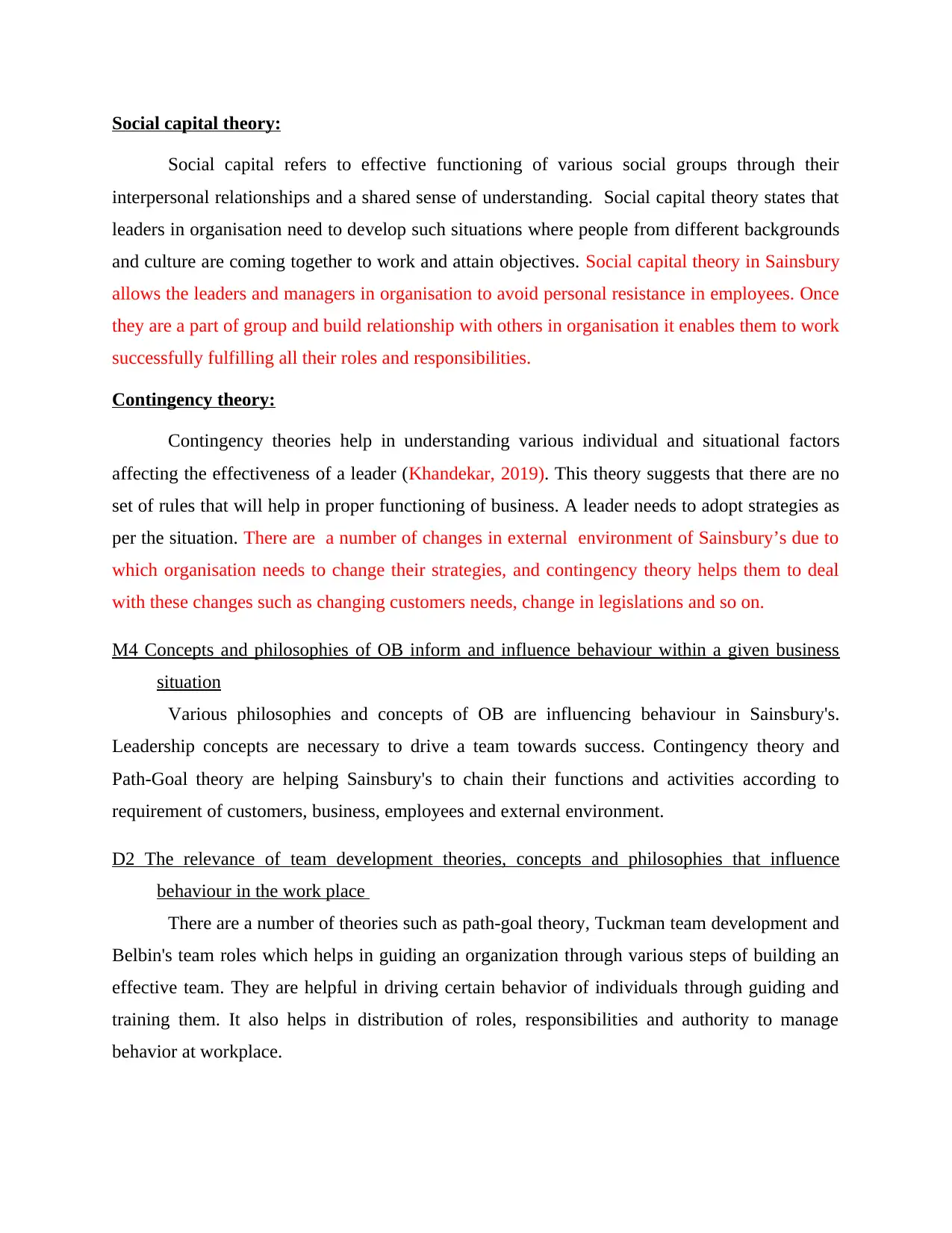
Social capital theory:
Social capital refers to effective functioning of various social groups through their
interpersonal relationships and a shared sense of understanding. Social capital theory states that
leaders in organisation need to develop such situations where people from different backgrounds
and culture are coming together to work and attain objectives. Social capital theory in Sainsbury
allows the leaders and managers in organisation to avoid personal resistance in employees. Once
they are a part of group and build relationship with others in organisation it enables them to work
successfully fulfilling all their roles and responsibilities.
Contingency theory:
Contingency theories help in understanding various individual and situational factors
affecting the effectiveness of a leader (Khandekar, 2019). This theory suggests that there are no
set of rules that will help in proper functioning of business. A leader needs to adopt strategies as
per the situation. There are a number of changes in external environment of Sainsbury’s due to
which organisation needs to change their strategies, and contingency theory helps them to deal
with these changes such as changing customers needs, change in legislations and so on.
M4 Concepts and philosophies of OB inform and influence behaviour within a given business
situation
Various philosophies and concepts of OB are influencing behaviour in Sainsbury's.
Leadership concepts are necessary to drive a team towards success. Contingency theory and
Path-Goal theory are helping Sainsbury's to chain their functions and activities according to
requirement of customers, business, employees and external environment.
D2 The relevance of team development theories, concepts and philosophies that influence
behaviour in the work place
There are a number of theories such as path-goal theory, Tuckman team development and
Belbin's team roles which helps in guiding an organization through various steps of building an
effective team. They are helpful in driving certain behavior of individuals through guiding and
training them. It also helps in distribution of roles, responsibilities and authority to manage
behavior at workplace.
Social capital refers to effective functioning of various social groups through their
interpersonal relationships and a shared sense of understanding. Social capital theory states that
leaders in organisation need to develop such situations where people from different backgrounds
and culture are coming together to work and attain objectives. Social capital theory in Sainsbury
allows the leaders and managers in organisation to avoid personal resistance in employees. Once
they are a part of group and build relationship with others in organisation it enables them to work
successfully fulfilling all their roles and responsibilities.
Contingency theory:
Contingency theories help in understanding various individual and situational factors
affecting the effectiveness of a leader (Khandekar, 2019). This theory suggests that there are no
set of rules that will help in proper functioning of business. A leader needs to adopt strategies as
per the situation. There are a number of changes in external environment of Sainsbury’s due to
which organisation needs to change their strategies, and contingency theory helps them to deal
with these changes such as changing customers needs, change in legislations and so on.
M4 Concepts and philosophies of OB inform and influence behaviour within a given business
situation
Various philosophies and concepts of OB are influencing behaviour in Sainsbury's.
Leadership concepts are necessary to drive a team towards success. Contingency theory and
Path-Goal theory are helping Sainsbury's to chain their functions and activities according to
requirement of customers, business, employees and external environment.
D2 The relevance of team development theories, concepts and philosophies that influence
behaviour in the work place
There are a number of theories such as path-goal theory, Tuckman team development and
Belbin's team roles which helps in guiding an organization through various steps of building an
effective team. They are helpful in driving certain behavior of individuals through guiding and
training them. It also helps in distribution of roles, responsibilities and authority to manage
behavior at workplace.
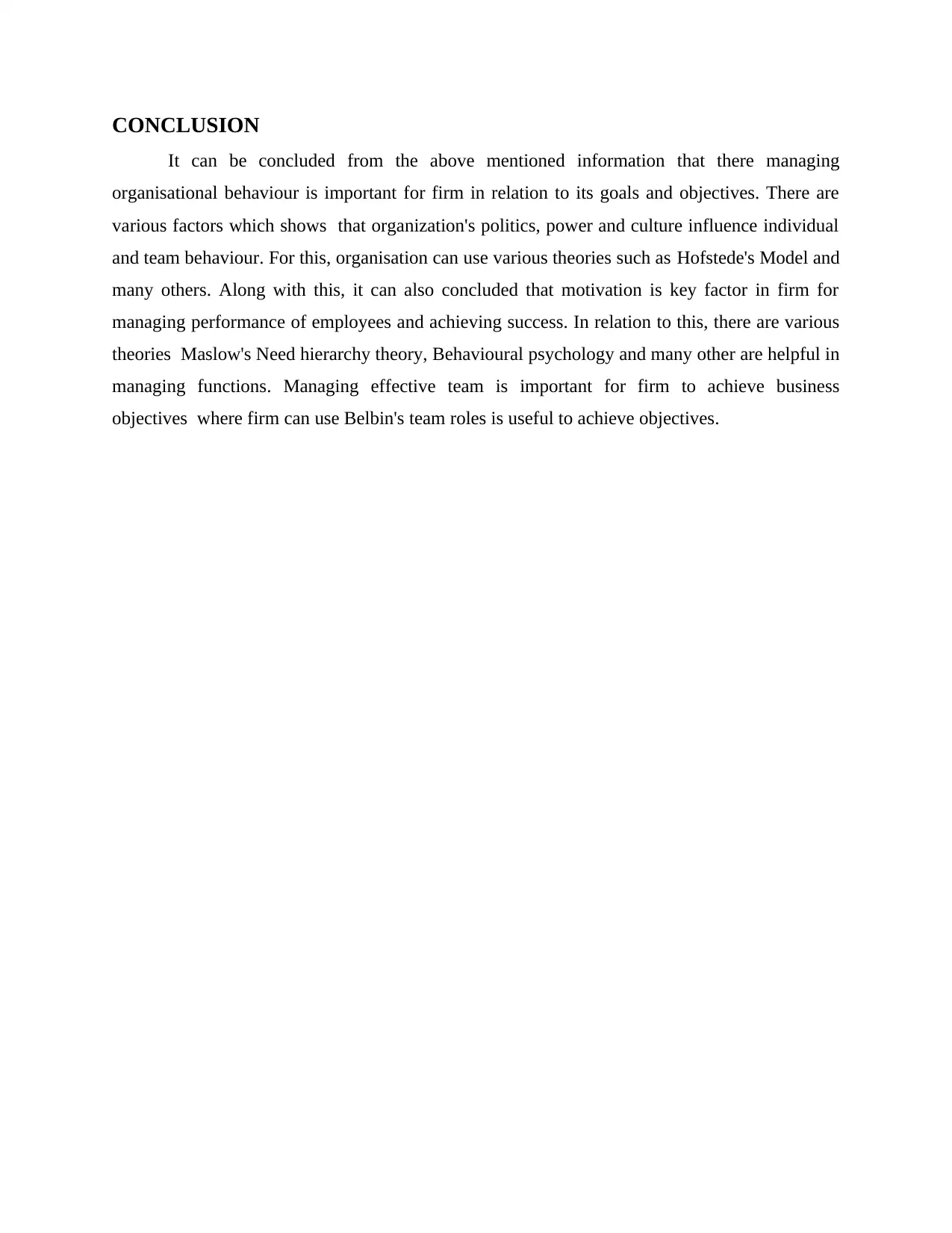
CONCLUSION
It can be concluded from the above mentioned information that there managing
organisational behaviour is important for firm in relation to its goals and objectives. There are
various factors which shows that organization's politics, power and culture influence individual
and team behaviour. For this, organisation can use various theories such as Hofstede's Model and
many others. Along with this, it can also concluded that motivation is key factor in firm for
managing performance of employees and achieving success. In relation to this, there are various
theories Maslow's Need hierarchy theory, Behavioural psychology and many other are helpful in
managing functions. Managing effective team is important for firm to achieve business
objectives where firm can use Belbin's team roles is useful to achieve objectives.
It can be concluded from the above mentioned information that there managing
organisational behaviour is important for firm in relation to its goals and objectives. There are
various factors which shows that organization's politics, power and culture influence individual
and team behaviour. For this, organisation can use various theories such as Hofstede's Model and
many others. Along with this, it can also concluded that motivation is key factor in firm for
managing performance of employees and achieving success. In relation to this, there are various
theories Maslow's Need hierarchy theory, Behavioural psychology and many other are helpful in
managing functions. Managing effective team is important for firm to achieve business
objectives where firm can use Belbin's team roles is useful to achieve objectives.
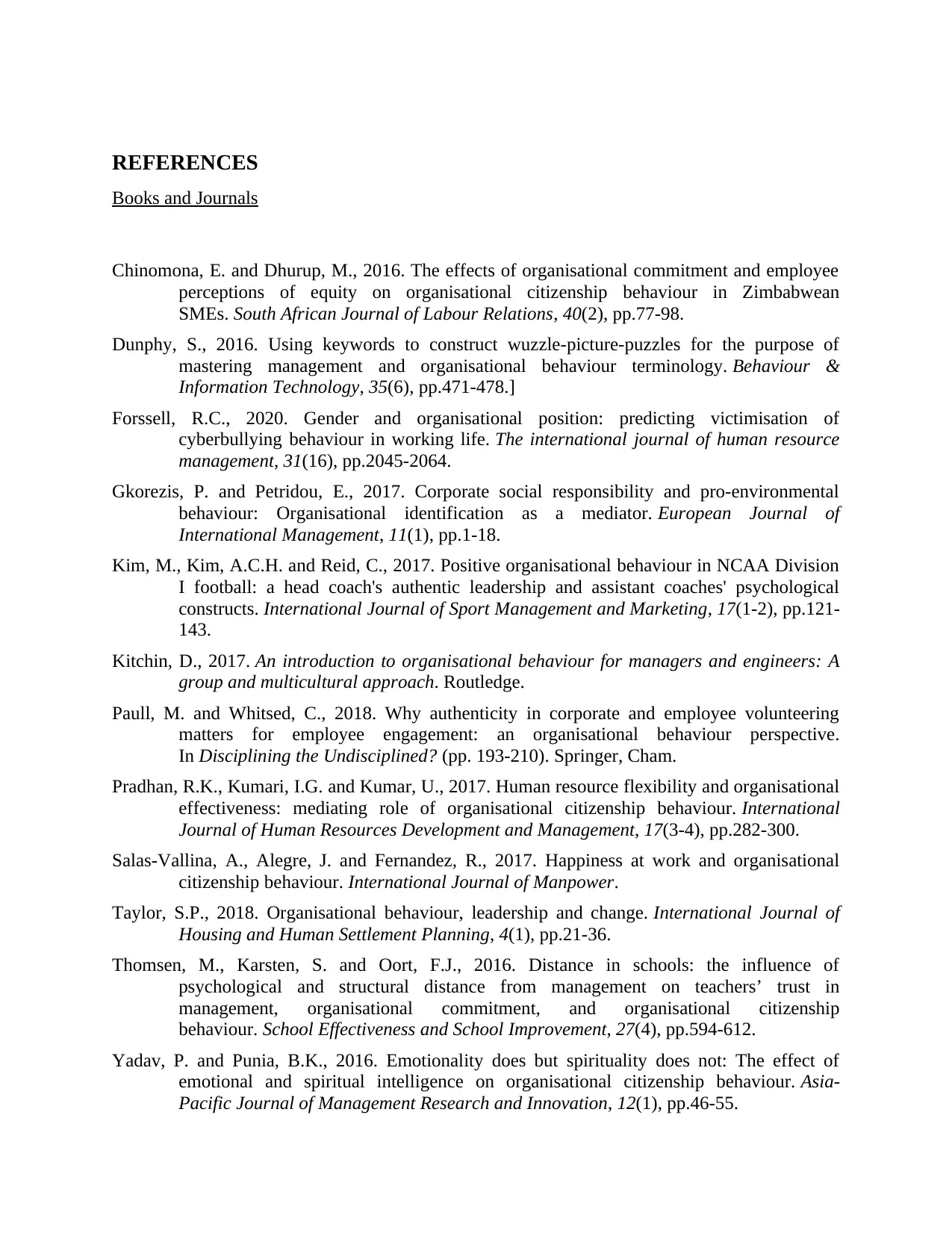
REFERENCES
Books and Journals
Chinomona, E. and Dhurup, M., 2016. The effects of organisational commitment and employee
perceptions of equity on organisational citizenship behaviour in Zimbabwean
SMEs. South African Journal of Labour Relations, 40(2), pp.77-98.
Dunphy, S., 2016. Using keywords to construct wuzzle-picture-puzzles for the purpose of
mastering management and organisational behaviour terminology. Behaviour &
Information Technology, 35(6), pp.471-478.]
Forssell, R.C., 2020. Gender and organisational position: predicting victimisation of
cyberbullying behaviour in working life. The international journal of human resource
management, 31(16), pp.2045-2064.
Gkorezis, P. and Petridou, E., 2017. Corporate social responsibility and pro-environmental
behaviour: Organisational identification as a mediator. European Journal of
International Management, 11(1), pp.1-18.
Kim, M., Kim, A.C.H. and Reid, C., 2017. Positive organisational behaviour in NCAA Division
I football: a head coach's authentic leadership and assistant coaches' psychological
constructs. International Journal of Sport Management and Marketing, 17(1-2), pp.121-
143.
Kitchin, D., 2017. An introduction to organisational behaviour for managers and engineers: A
group and multicultural approach. Routledge.
Paull, M. and Whitsed, C., 2018. Why authenticity in corporate and employee volunteering
matters for employee engagement: an organisational behaviour perspective.
In Disciplining the Undisciplined? (pp. 193-210). Springer, Cham.
Pradhan, R.K., Kumari, I.G. and Kumar, U., 2017. Human resource flexibility and organisational
effectiveness: mediating role of organisational citizenship behaviour. International
Journal of Human Resources Development and Management, 17(3-4), pp.282-300.
Salas-Vallina, A., Alegre, J. and Fernandez, R., 2017. Happiness at work and organisational
citizenship behaviour. International Journal of Manpower.
Taylor, S.P., 2018. Organisational behaviour, leadership and change. International Journal of
Housing and Human Settlement Planning, 4(1), pp.21-36.
Thomsen, M., Karsten, S. and Oort, F.J., 2016. Distance in schools: the influence of
psychological and structural distance from management on teachers’ trust in
management, organisational commitment, and organisational citizenship
behaviour. School Effectiveness and School Improvement, 27(4), pp.594-612.
Yadav, P. and Punia, B.K., 2016. Emotionality does but spirituality does not: The effect of
emotional and spiritual intelligence on organisational citizenship behaviour. Asia-
Pacific Journal of Management Research and Innovation, 12(1), pp.46-55.
Books and Journals
Chinomona, E. and Dhurup, M., 2016. The effects of organisational commitment and employee
perceptions of equity on organisational citizenship behaviour in Zimbabwean
SMEs. South African Journal of Labour Relations, 40(2), pp.77-98.
Dunphy, S., 2016. Using keywords to construct wuzzle-picture-puzzles for the purpose of
mastering management and organisational behaviour terminology. Behaviour &
Information Technology, 35(6), pp.471-478.]
Forssell, R.C., 2020. Gender and organisational position: predicting victimisation of
cyberbullying behaviour in working life. The international journal of human resource
management, 31(16), pp.2045-2064.
Gkorezis, P. and Petridou, E., 2017. Corporate social responsibility and pro-environmental
behaviour: Organisational identification as a mediator. European Journal of
International Management, 11(1), pp.1-18.
Kim, M., Kim, A.C.H. and Reid, C., 2017. Positive organisational behaviour in NCAA Division
I football: a head coach's authentic leadership and assistant coaches' psychological
constructs. International Journal of Sport Management and Marketing, 17(1-2), pp.121-
143.
Kitchin, D., 2017. An introduction to organisational behaviour for managers and engineers: A
group and multicultural approach. Routledge.
Paull, M. and Whitsed, C., 2018. Why authenticity in corporate and employee volunteering
matters for employee engagement: an organisational behaviour perspective.
In Disciplining the Undisciplined? (pp. 193-210). Springer, Cham.
Pradhan, R.K., Kumari, I.G. and Kumar, U., 2017. Human resource flexibility and organisational
effectiveness: mediating role of organisational citizenship behaviour. International
Journal of Human Resources Development and Management, 17(3-4), pp.282-300.
Salas-Vallina, A., Alegre, J. and Fernandez, R., 2017. Happiness at work and organisational
citizenship behaviour. International Journal of Manpower.
Taylor, S.P., 2018. Organisational behaviour, leadership and change. International Journal of
Housing and Human Settlement Planning, 4(1), pp.21-36.
Thomsen, M., Karsten, S. and Oort, F.J., 2016. Distance in schools: the influence of
psychological and structural distance from management on teachers’ trust in
management, organisational commitment, and organisational citizenship
behaviour. School Effectiveness and School Improvement, 27(4), pp.594-612.
Yadav, P. and Punia, B.K., 2016. Emotionality does but spirituality does not: The effect of
emotional and spiritual intelligence on organisational citizenship behaviour. Asia-
Pacific Journal of Management Research and Innovation, 12(1), pp.46-55.
Paraphrase This Document
Need a fresh take? Get an instant paraphrase of this document with our AI Paraphraser
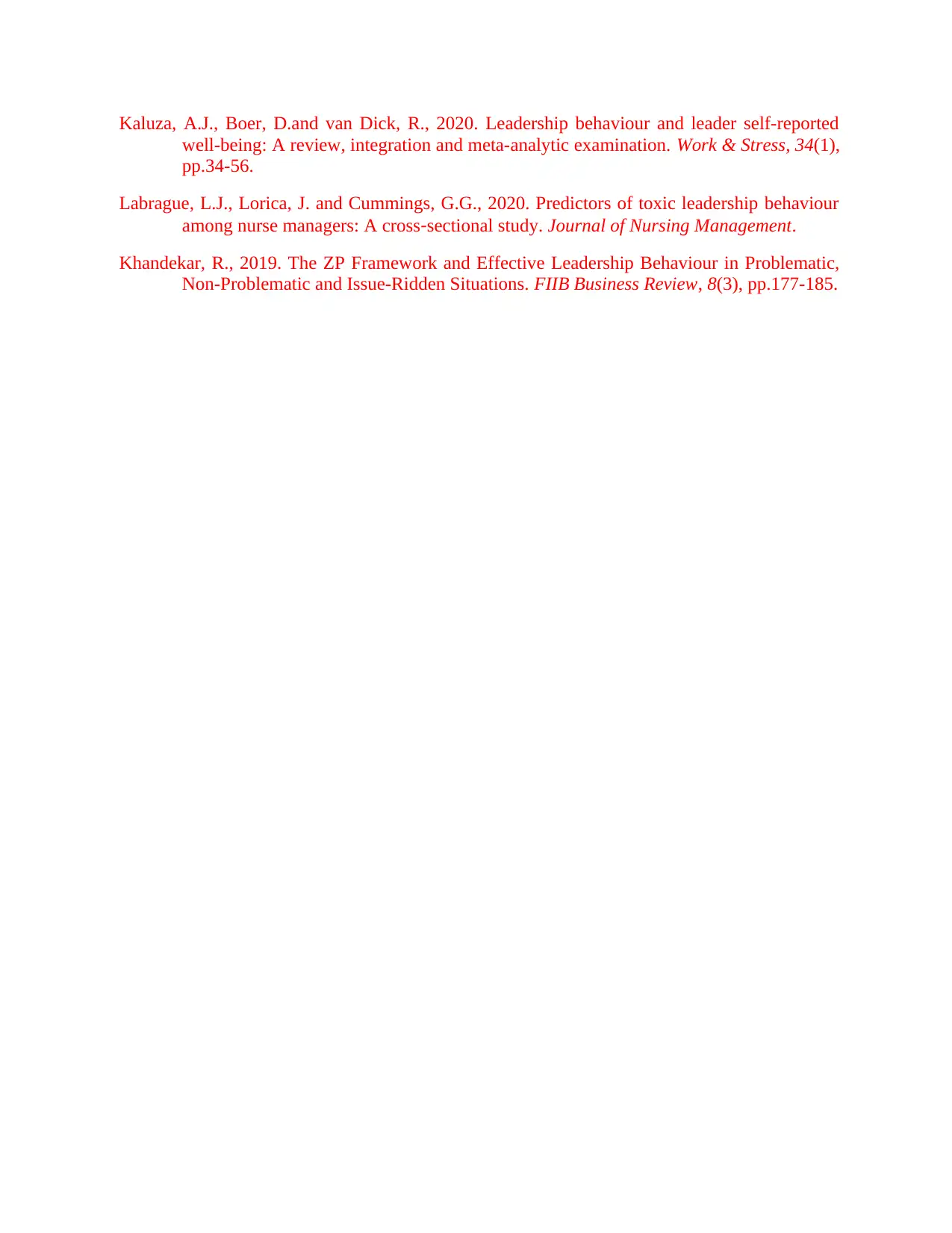
Kaluza, A.J., Boer, D.and van Dick, R., 2020. Leadership behaviour and leader self-reported
well-being: A review, integration and meta-analytic examination. Work & Stress, 34(1),
pp.34-56.
Labrague, L.J., Lorica, J. and Cummings, G.G., 2020. Predictors of toxic leadership behaviour
among nurse managers: A cross‐sectional study. Journal of Nursing Management.
Khandekar, R., 2019. The ZP Framework and Effective Leadership Behaviour in Problematic,
Non-Problematic and Issue-Ridden Situations. FIIB Business Review, 8(3), pp.177-185.
well-being: A review, integration and meta-analytic examination. Work & Stress, 34(1),
pp.34-56.
Labrague, L.J., Lorica, J. and Cummings, G.G., 2020. Predictors of toxic leadership behaviour
among nurse managers: A cross‐sectional study. Journal of Nursing Management.
Khandekar, R., 2019. The ZP Framework and Effective Leadership Behaviour in Problematic,
Non-Problematic and Issue-Ridden Situations. FIIB Business Review, 8(3), pp.177-185.
1 out of 20
Related Documents
Your All-in-One AI-Powered Toolkit for Academic Success.
+13062052269
info@desklib.com
Available 24*7 on WhatsApp / Email
![[object Object]](/_next/static/media/star-bottom.7253800d.svg)
Unlock your academic potential
© 2024 | Zucol Services PVT LTD | All rights reserved.





